Browsing News Entries
Vatican to publish document on ‘moral questions’ regarding human dignity, gender, surrogacy
Posted on 04/2/2024 17:15 PM (CNA Daily News - Vatican)
 Cardinal Víctor Manuel Fernández, pictured here in 2014, took up his new post as prefect of the Dicastery for the Doctrine of the Faith in September 2023. / Credit: Daniel Ibanez/CNA
Cardinal Víctor Manuel Fernández, pictured here in 2014, took up his new post as prefect of the Dicastery for the Doctrine of the Faith in September 2023. / Credit: Daniel Ibanez/CNA
Rome Newsroom, Apr 2, 2024 / 15:15 pm (CNA).
The Vatican’s top doctrinal office next week will unveil a new declaration on the theme of human dignity, one that is expected to address a range of contemporary moral issues including gender ideology and surrogacy.
The Holy See Press Office announced on Tuesday that the new document, titled Dignitas Infinita (“Infinite Dignity”) (On Human Dignity), will be debuted at a press conference held in Rome on April 8.
The conference will include presentations by Cardinal Víctor Manuel Fernández, the prefect of the Dicastery for the Doctrine of the Faith (DDF); Monsignor Armando Matteo, secretary for the doctrinal section of the DDF; and Professor Paola Scarcella of Rome’s Tor Vergata and LUMSA universities.
In an interview with the National Catholic Register, CNA’s sister news partner, in early March, Fernández said there had been “several versions” of the text and that it was “almost finished” and would be published in “early April.”
The cardinal’s comments came after he told Spanish news agency EFE in January that the text would address “not only social issues but also a strong criticism of moral questions such as sex-change surgery, surrogacy, and gender ideology.”
In recent months and years Pope Francis has spoken out strongly on these topics. In a January address to the ambassadors accredited to the Holy See, the pope called surrogacy “deplorable.”
In March, meanwhile, the Holy Father labeled transgender ideology as “the ugliest danger” today, one that “seeks to blur differences between men and women.”
Since assuming the top spot at the DDF last September, Fernández has faced backlash over the December DDF document Fiducia Supplicans, which allowed for the “spontaneous” (nonliturgical) blessing of same-sex couples as well as those in “irregular” unions.
The Argentine cardinal in his interview with EFE argued that “people who are concerned” about his work will “be put at ease” by the new document.
Since the publication of Fiducia Supplicans, Pope Francis has publicly defended the directive on numerous occasions. In February he argued that individuals who are critical of blessings for homosexuals are guilty of “hypocrisy” if they are not similarly opposed to blessings for certain other types of sinners.
Some of the strongest pushback against Fiducia Supplicans has come from the Symposium of Episcopal Conferences of Africa and Madagascar (SECAM) as well as from other Christian leaders with which the Church holds ecumenical dialogue.
This is Pope Francis’ prayer intention for the month of April
Posted on 04/2/2024 14:40 PM (CNA Daily News - Vatican)
 Pope Francis greets a woman religious at a Mass on the World Day of Consecrated Life, the feast of the Presentation of the Lord, on Feb. 2, 2024, in St. Peter's Basilica at the Vatican. / Credit: Vatican Media
Pope Francis greets a woman religious at a Mass on the World Day of Consecrated Life, the feast of the Presentation of the Lord, on Feb. 2, 2024, in St. Peter's Basilica at the Vatican. / Credit: Vatican Media
CNA Staff, Apr 2, 2024 / 12:40 pm (CNA).
Pope Francis’ prayer intention for the month of April is that the dignity and worth of women be recognized throughout the world.
“In many parts of the world, women are treated like the first thing to get rid of,” Pope Francis said in a video released April 2.
“There are countries where women are forbidden to access aid, open a business, or go to school,” he said, adding: “In these places, they are subject to laws that make them dress a certain way. And in many countries, genital mutilation is still practiced.”
He urged the world to “not deprive women of their voice. Let us not rob all these abused women of their voice. They are exploited, marginalized.”
The Holy Father pointed out that “in theory, we all agree that men and women have the same dignity as persons. But this does not play out in practice.”
“Governments need to commit to eliminate discriminatory laws everywhere and to work toward guaranteeing women’s human rights,” Francis said.
“Let us respect women. Let us respect their dignity, their basic rights. And if we don’t, our society will not progress.”
He concluded with a prayer: “Let us pray that the dignity and worth of women be recognized in every culture, and for an end to the discrimination they face in various parts of the world.”
Pope Francis’ prayer video is promoted by the Pope’s Worldwide Prayer Network, which raises awareness of monthly papal prayer intentions.
Pope Francis: I was ‘used’ against Ratzinger in 2005 conclave, but he was ‘my candidate’
Posted on 04/1/2024 15:30 PM (CNA Daily News - Vatican)
 Cardinal Joseph Ratzinger celebrates the special "pro eligendo summo pontifice" (to elect Supreme Pontiff) Mass at St Peter's Basilica in the Vatican City on April 18, 2005. / Credit: MARCO LONGARI/AFP via Getty Images
Cardinal Joseph Ratzinger celebrates the special "pro eligendo summo pontifice" (to elect Supreme Pontiff) Mass at St Peter's Basilica in the Vatican City on April 18, 2005. / Credit: MARCO LONGARI/AFP via Getty Images
CNA Staff, Apr 1, 2024 / 13:30 pm (CNA).
Pope Francis said he was “used” in the 2005 conclave in an effort to block the election of Cardinal Joseph Ratzinger, though he supported the candidacy of the man who soon became Pope Benedict XVI.
“He was my candidate,” Francis said of his predecessor in excerpts from the forthcoming book “The Successor,” published by the Spanish newspaper ABC on Easter Sunday.
In the book, Pope Francis told Spanish journalist Javier Martínez-Brocal that his name, then-Cardinal Jose Mario Bergoglio of Buenos Aires, was put forward as part of a “complete maneuver” by an unnamed group of cardinals to manipulate the conclave’s outcome.
“The idea was to block the election of [Ratzinger],” he explained. “They were using me, but behind them they were already thinking about proposing another cardinal. They still couldn’t agree on who, but they were already on the verge of throwing out a name.”
Francis said that at one point of the conclave, which began on April 18, 2005, he was receiving 40 of the 115 total votes. If cardinals continued to support him, Ratzinger would not have reached the necessary two-thirds threshold to be elected, likely prompting a search for an alternative candidate.
Francis said that he realized the “operation” was afoot on the second day of voting and told the Colombian Cardinal Dario Castrillón to not “joke with my candidacy” and cease supporting him, “because I’m not going to accept” being elected.
Austen Ivereigh, the pope’s English-speaking biographer, has previously written that Bergoglio, “almost in tears,” had begged not to be elected.
Ratzinger, who had been the longtime prefect of the Congregation for the Doctrine of the Faith under Pope John Paul II, was elected that same day.
Pope Francis did not say who this group of conclave manipulators consisted of nor who they planned to introduce as a third candidate, but the Argentinian prelate said that the group of cardinals “did not want a ‘foreign’ pope.”
Several accounts from the time have claimed that a group of liberal European cardinals, known as the Saint Gallen Group, attempted to manipulate the outcome of the 2005 conclave. Three members of the group, German Cardinals Walter Kasper and Karl Lehmann and Belgian Cardinal Godfried Danneels, also participated in the 2013 conclave that elected Francis. According to Ivereigh, they advocated for Bergoglio after first securing his assent, a claim the cardinals have denied.
According to Universi Dominici Gregis, an apostolic constitution governing papal conclaves, cardinal electors must refrain from “any form of pact, agreement, promise, or other commitment of any kind which could oblige them to give or deny their vote to a person or persons” under threat of automatic excommunication.
Conclave proceedings are, by definition, secretive, as the term is derived from a Latin word that means a “locked room.” But in “The Successor,” Francis said that while cardinals are sworn to secrecy regarding conclave proceedings, “the popes have license to tell it.”
Pope Francis also revealed that while others were putting his name forward in the hopes of forcing a stalemate, he believed Ratzinger “was the only one at that time [who] could be pope.”
“After the revolution of John Paul II, who had been a dynamic pontiff, very active, with initiative who traveled … there was a need for a pope who maintained a healthy balance, a transitional pope,” the Holy Father said of his predecessor, who served from 2005 to 2013.
Francis also said that he left Rome happy that Ratzinger had been elected and not himself.
“If they had chosen someone like me, who makes a lot of trouble, I wouldn’t have been able to do anything,” he said. “At that time, it would not have been possible.”
Nonetheless, Pope Francis added that the papacy “wasn’t easy” for Benedict XVI, who “encountered a lot of resistance within the Vatican.”
Pope Francis was also asked what the Holy Spirit was saying to the Church through the election of Benedict XVI.
“’I am in charge here,’” Francis said of the Spirit’s response. “’There is no room for maneuver.’”
“The Successor” is part of a flurry of Francis-focused books being released in the 87-year-old Jesuit’s 11th year as pontiff, which also includes “Life: My Story Through History,” the pope’s first autobiography.
The new book, which focuses on the relationship between Pope Francis and Benedict XVI, is set to be published in Spanish on Wednesday, April 3, with no details yet available on an English edition.
Pope Francis: The resurrection of Jesus changes our lives completely and forever
Posted on 04/1/2024 11:00 AM (CNA Daily News - Vatican)
 Pope Francis delivers the Regina Caeli address on Monday, Apr. 1, 2024 / Vatican Media
Pope Francis delivers the Regina Caeli address on Monday, Apr. 1, 2024 / Vatican Media
Rome Newsroom, Apr 1, 2024 / 09:00 am (CNA).
Pope Francis said on Easter Monday that the resurrection of Jesus is not just a “happy ending” but is an event that “changes our lives completely and forever.”
“Jesus broke through the darkness of the tomb and lives forever. … With him, every day becomes a step in an eternal journey, every today can hope for a tomorrow, every end a new beginning, every instant is projected beyond the limits of time, toward eternity,” the pope said on April 1.
“Brothers, sisters, the joy of the Resurrection is not something far away. It is very close; it is ours because it was given to us on the day of our baptism.”
Pope Francis addressed a crowd of people in St. Peter’s Square from a window of the Apostolic Palace for Easter Monday, also known as Monday of the Angel.
Following his brief message, he recited the Regina Caeli, a Latin antiphon honoring the Virgin Mary that is prayed during the Easter season. From Easter Sunday to Pentecost, Pope Francis will pray the Regina Caeli instead of the Angelus on Sundays.
In his address, the pope offered advice for how to “fuel the joy” of Christ’s resurrection during the Easter season, which in the Catholic Church lasts for a total of 50 days, from Easter Sunday until the feast of Pentecost.
Pope Francis said that the joy of Easter can be nurtured by “encountering the Risen One” in the Eucharist, in the confessional, in prayer, and in charity.
“He is the source of a joy that never ceases. So, let us hasten to seek him,” the pope said.
“Joy, when it is shared, grows. Let us share the joy of the Risen One,” he added.
The pope pointed to how in the Church’s readings for the Monday of the Easter Octave, the Gospel of Matthew describes the joy of the women at the resurrection of Jesus.
“The text says they abandoned the tomb with ‘great joy’ and ran to tell his disciples” (Mt 28:8). This joy, which is born precisely from the living encounter with the Risen One, is a powerful emotion, which impels them to spread and to tell what they have seen,” he said.
“Sharing joy is a wondrous experience, which we learn from a very young age: Think of a child who gets a good mark at school and cannot wait to show his or her parents, or a young person who achieves their first success in sport, or a family in which a child is born. Let us try to remember, each of us, a moment so happy that it was even difficult to put it into words, but which we wished to tell everyone about immediately.”
“And May the Virgin Mary, who at Easter rejoiced in her risen Son, help us to be joyful witnesses,” he added.
After the Regina Caeli, the pope wished everyone a happy Monday of the Angel and a happy Octave of Easter.
“May the joy of Easter continue!” Pope Francis said.
Full text of Pope Francis’ urbi et orbi blessing for Easter 2024
Posted on 03/31/2024 11:15 AM (CNA Daily News - Vatican)
 Pope Francis gives his urbi et orbi Easter blessing from the central loggia of St. Peter’s Basilica on March 31, 2024. / Credit: Pablo Esparza/CNA
Pope Francis gives his urbi et orbi Easter blessing from the central loggia of St. Peter’s Basilica on March 31, 2024. / Credit: Pablo Esparza/CNA
Vatican City, Mar 31, 2024 / 09:15 am (CNA).
On the morning of Easter Sunday 2024, Pope Francis presided over Mass in St. Peter’s Square before delivering his urbi et orbi message and blessing from the central loggia of St. Peter’s Basilica in the presence of an estimated 60,000 people.
“Urbi et orbi” means “To the city [of Rome] and to the world.” It is a special apostolic blessing given by the pope every year on Easter Sunday, Christmas, and other special occasions.
Here is the full text of the pope’s blessing:
Dear brothers and sisters: Happy Easter!
Today throughout the world there resounds the message proclaimed 2,000 years ago from Jerusalem: “Jesus of Nazareth, who was crucified, has been raised!” (Mk 16:6).
The Church relives the amazement of the women who went to the tomb at dawn on the first day of the week. The tomb of Jesus had been sealed with a great stone. Today too, great stones, heavy stones, block the hopes of humanity: the stone of war, the stone of humanitarian crises, the stone of human rights violations, the stone of human trafficking, and other stones as well. Like the women disciples of Jesus, we ask one another: “Who will roll away the stone for us from the entrance to the tomb?” (cf. Mk 16:3).
This is the amazing discovery of that Easter morning: The stone, the immense stone, was rolled away. The astonishment of the women is our astonishment as well: The tomb of Jesus is open, and it is empty! From this, everything begins anew! A new path leads through that empty tomb: The path that none of us, but God alone, could open: the path of life in the midst of death, the path of peace in the midst of war, the path of reconciliation in the midst of hatred, the path of fraternity in the midst of hostility.
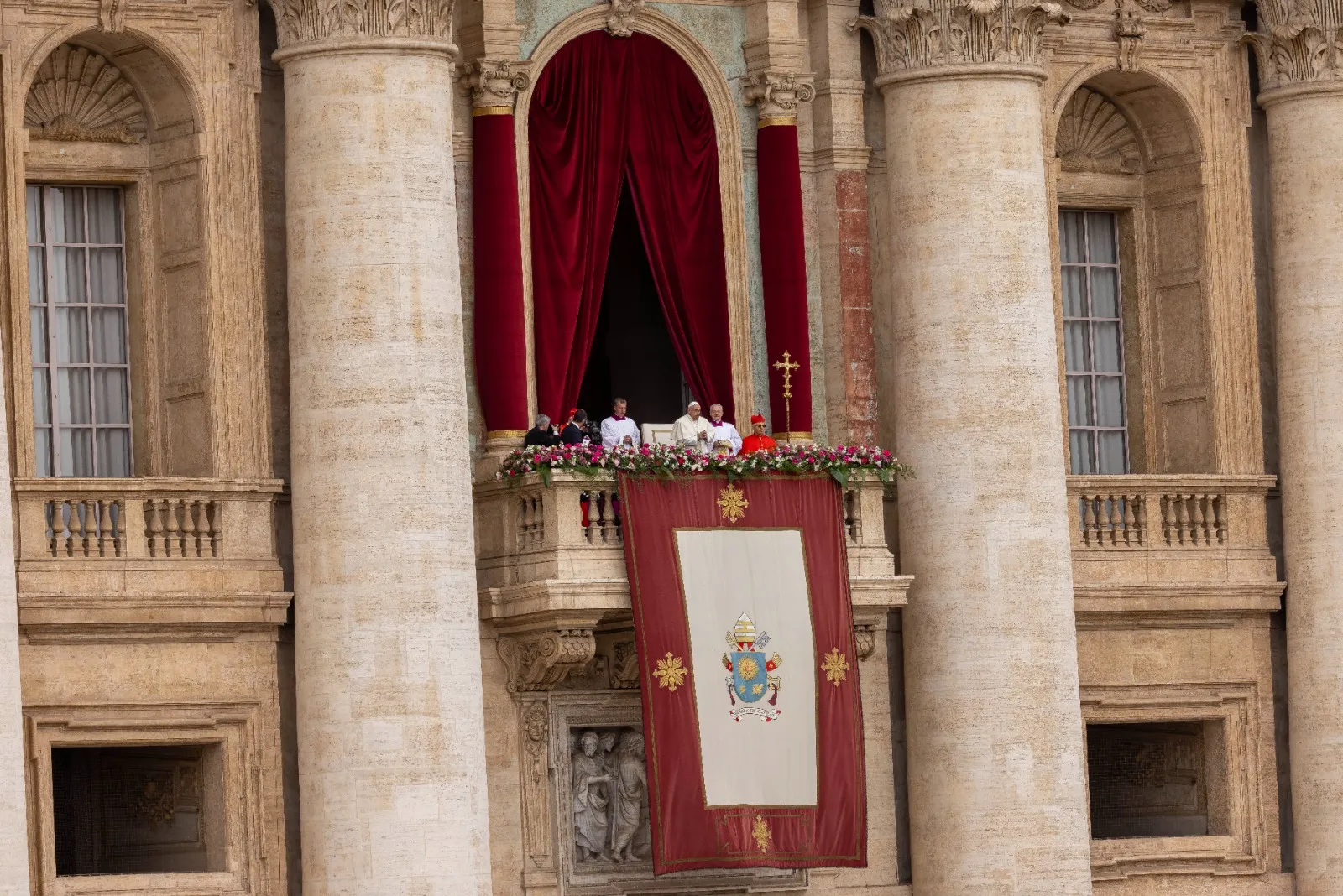
Brothers and sisters, Jesus Christ is risen! He alone has the power to roll away the stones that block the path to life. He, the living One, is himself that path. He is the Way: the way that leads to life, the way of peace, reconciliation, and fraternity. He opens that path, humanly impossible, because he alone takes away the sin of the world and forgives us our sins. For without God’s forgiveness, that stone cannot be removed. Without the forgiveness of sins, there is no overcoming the barriers of prejudice, mutual recrimination, the presumption that we are always right and others wrong. Only the risen Christ, by granting us the forgiveness of our sins, opens the way for a renewed world.
Jesus alone opens up before us the doors of life, those doors that continually we shut with the wars spreading throughout the world. Today we want, first and foremost, to turn our eyes to the holy city of Jerusalem, that witnessed the mystery of the passion, death, and resurrection of Jesus, and to all the Christian communities of the Holy Land.
My thoughts go especially to the victims of the many conflicts worldwide, beginning with those in Israel and Palestine, and in Ukraine. May the risen Christ open a path of peace for the war-torn peoples of those regions. In calling for respect for the principles of international law, I express my hope for a general exchange of all prisoners between Russia and Ukraine: all for the sake of all!
I appeal once again that access to humanitarian aid be ensured to Gaza, and call once more for the prompt release of the hostages seized on 7 October last and for an immediate cease-fire in the Strip.
Let us not allow the current hostilities to continue to have grave repercussions on the civil population, by now at the limit of its endurance, and above all on the children. How much suffering we see in the eyes of the children: The children in those lands at war have forgotten how to smile! With those eyes, they ask us: Why? Why all this death? Why all this destruction? War is always an absurdity, war is always a defeat! Let us not allow the strengthening winds of war to blow on Europe and the Mediterranean. Let us not yield to the logic of weapons and rearming. Peace is never made with arms, but with outstretched hands and open hearts.
Brothers and sisters, let us not forget Syria, which for 13 years has suffered from the effects of a long and devastating war. So many deaths and disappearances, so much poverty and destruction call for a response on the part of everyone, and of the international community.
My thoughts turn today in a special way to Lebanon, which has for some time experienced institutional impasse and a deepening economic and social crisis, now aggravated by the hostilities on its border with Israel. May the risen Lord console the beloved Lebanese people and sustain the entire country in its vocation to be a land of encounter, coexistence, and pluralism.
I also think in particular of the region of the Western Balkans, where significant steps are being taken toward integration in the European project. May ethnic, cultural, and confessional differences not be a cause of division but rather a source of enrichment for all of Europe and for the world as a whole.
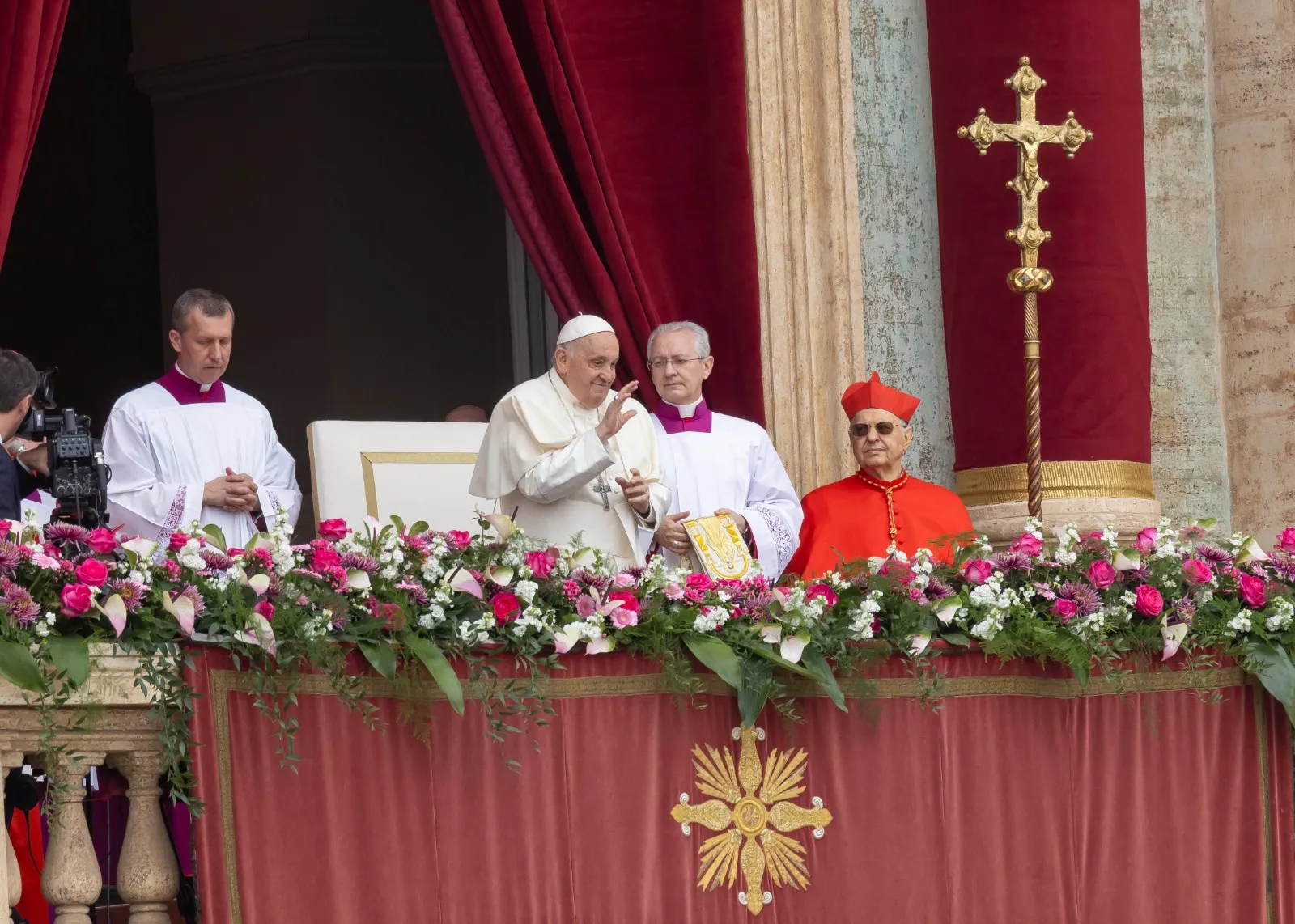
I likewise encourage the discussions taking place between Armenia and Azerbaijan, so that, with the support of the international community, they can pursue dialogue, assist the displaced, respect the places of worship of the various religious confessions, and arrive as soon as possible at a definitive peace agreement.
May the risen Christ open a path of hope to all those who in other parts of the world are suffering from violence, conflict, food insecurity, and the effects of climate change. May the Lord grant consolation to the victims of terrorism in all its forms. Let us pray for all those who have lost their lives and implore the repentance and conversion of the perpetrators of those crimes.
May the risen Lord assist the Haitian people, so that there can soon be an end to the acts of violence, devastation, and bloodshed in that country, and that it can advance on the path to democracy and fraternity.
May Christ grant consolation and strength to the Rohingya, beset by a grave humanitarian crisis, and open a path to reconciliation in Myanmar, torn for years now by internal conflicts, so that every logic of violence may be definitively abandoned.
May the Lord open paths of peace on the African continent, especially for the suffering peoples in Sudan and in the entire region of the Sahel, in the Horn of Africa, in the region of Kivu in the Democratic Republic of the Congo, and in the province of Capo Delgado in Mozambique, and bring an end to the prolonged situation of drought, which affects vast areas and provokes famine and hunger.
May the Risen One make the light of his face shine upon migrants and on all those who are passing through a period of economic difficulty, and offer them consolation and hope in their moment of need. May Christ guide all persons of goodwill to unite themselves in solidarity, in order to address together the many challenges that loom over the poorest families in their search for a better life and happiness.
On this day when we celebrate the life given us in the resurrection of the Son, let us remember the infinite love of God for each of us: a love that overcomes every limit and every weakness. And yet how much the precious gift of life is despised! How many children cannot even be born? How many die of hunger and are deprived of essential care or are victims of abuse and violence? How many lives are made objects of trafficking for the increasing commerce in human beings?
Brothers and sisters, on the day when Christ has set us free from the slavery of death, I appeal to all who have political responsibilities to spare no efforts in combatting the scourge of human trafficking, by working tirelessly to dismantle the networks of exploitation, and to bring freedom to those who are their victims. May the Lord comfort their families, above all those who anxiously await news of their loved ones, and ensure them comfort and hope.
May the light of the Resurrection illuminate our minds and convert our hearts, and make us aware of the value of every human life, which must be welcomed, protected, and loved.
A happy Easter to all!
Pope Francis on Easter: May the risen Christ open a path of peace in the Holy Land
Posted on 03/31/2024 10:45 AM (CNA Daily News - Vatican)
 Pope Francis gives his urbi et orbi message and blessing from the central loggia of St. Peter’s Basilica on March 31, 2024. / Credit: Vatican Media
Pope Francis gives his urbi et orbi message and blessing from the central loggia of St. Peter’s Basilica on March 31, 2024. / Credit: Vatican Media
Vatican City, Mar 31, 2024 / 08:45 am (CNA).
In his Easter Sunday blessing, Pope Francis asked the risen Lord to open paths of peace in the Holy Land, Ukraine, and all regions of the world suffering from war and violence.
Speaking from the central balcony of St. Peter’s Basilica on March 31, Pope Francis called for an immediate cease-fire in the Gaza Strip. He appealed for humanitarian access for the people of Gaza and called for the prompt release of the hostages seized by Hamas on Oct. 7, 2023.
“Jesus alone opens up before us the doors of life, those doors that continually we shut with the wars spreading throughout the world,” Pope Francis said.
“Today we want, first and foremost, to turn our eyes to the Holy City of Jerusalem, that witnessed the mystery of the passion, death, and resurrection of Jesus, and to all the Christian communities of the Holy Land.”
“My thoughts go especially to the victims of the many conflicts worldwide, beginning with those in Israel and Palestine, and in Ukraine. May the risen Christ open a path of peace for the war-torn peoples of those regions.”
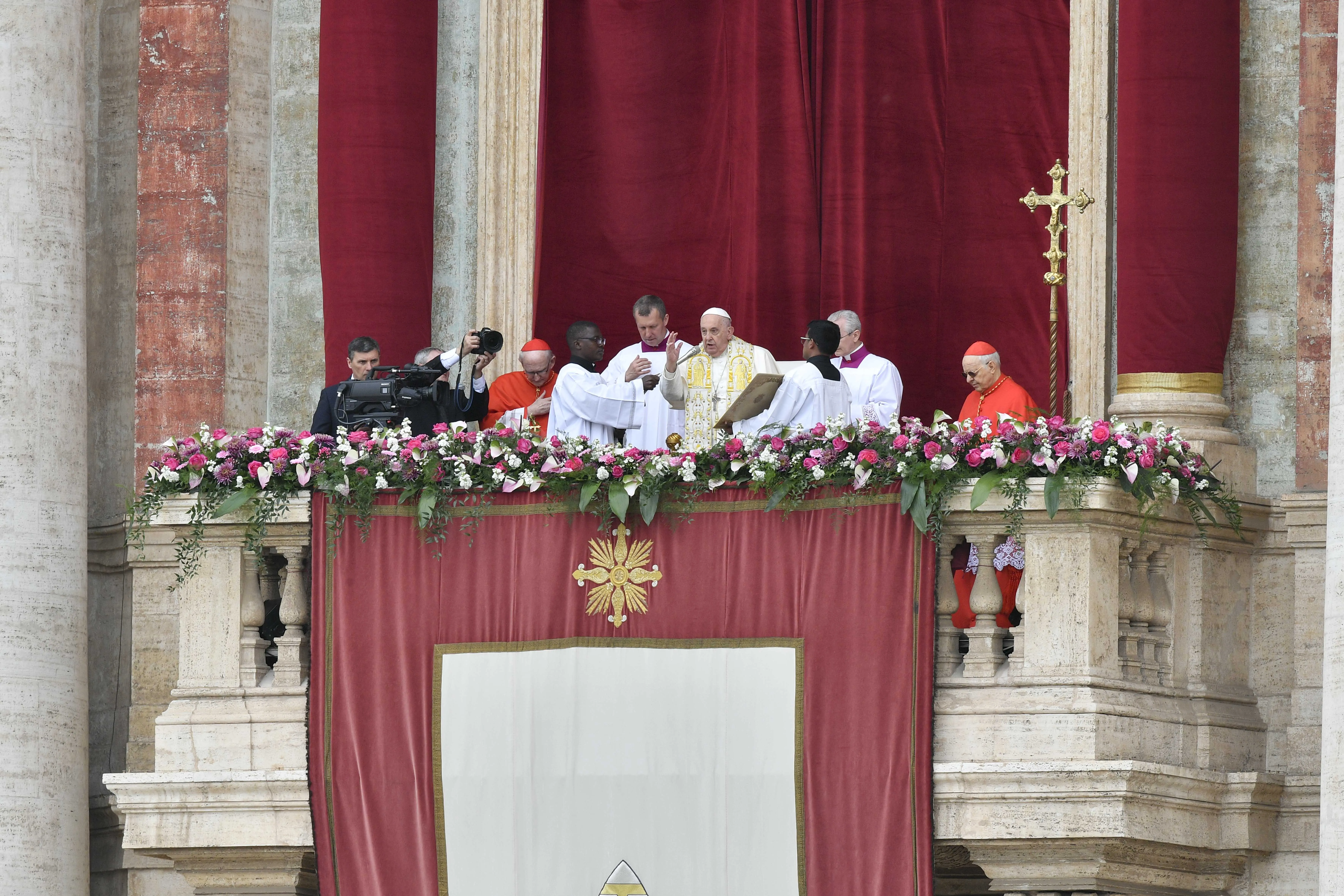
Pope Francis gave the traditional urbi et orbi blessing from the central loggia of St. Peter’s Basilica following Easter Sunday Mass in St. Peter’s Square in the presence of about 60,000 people.
“Urbi et orbi” means “To the city [of Rome] and to the world” and is a special apostolic blessing given by the pope every year on Easter Sunday, Christmas, and other special occasions.
Beginning with the Holy Land and Ukraine, Pope Francis prayed for the many countries in the world that are suffering from violence, poverty, instability, food insecurity, and conflicts.
“Let us not allow the current hostilities to continue to have grave repercussions on the civil population by now at the limit of its endurance,” Pope Francis said.
“How much suffering we see in the eyes of the children,” he said. “The children in those war zones have forgotten how to smile. With those eyes, they ask us: Why? Why all this death? Why all this destruction?”
“Peace is never made with arms but with outstretched hands and open hearts,” the pope added.
In his peace message, Pope Francis expressed hope for a general exchange of all prisoners between Russia and Ukraine. He also offered prayers for Syria and Lebanon whose populations continue to experience the devastating effects of war.
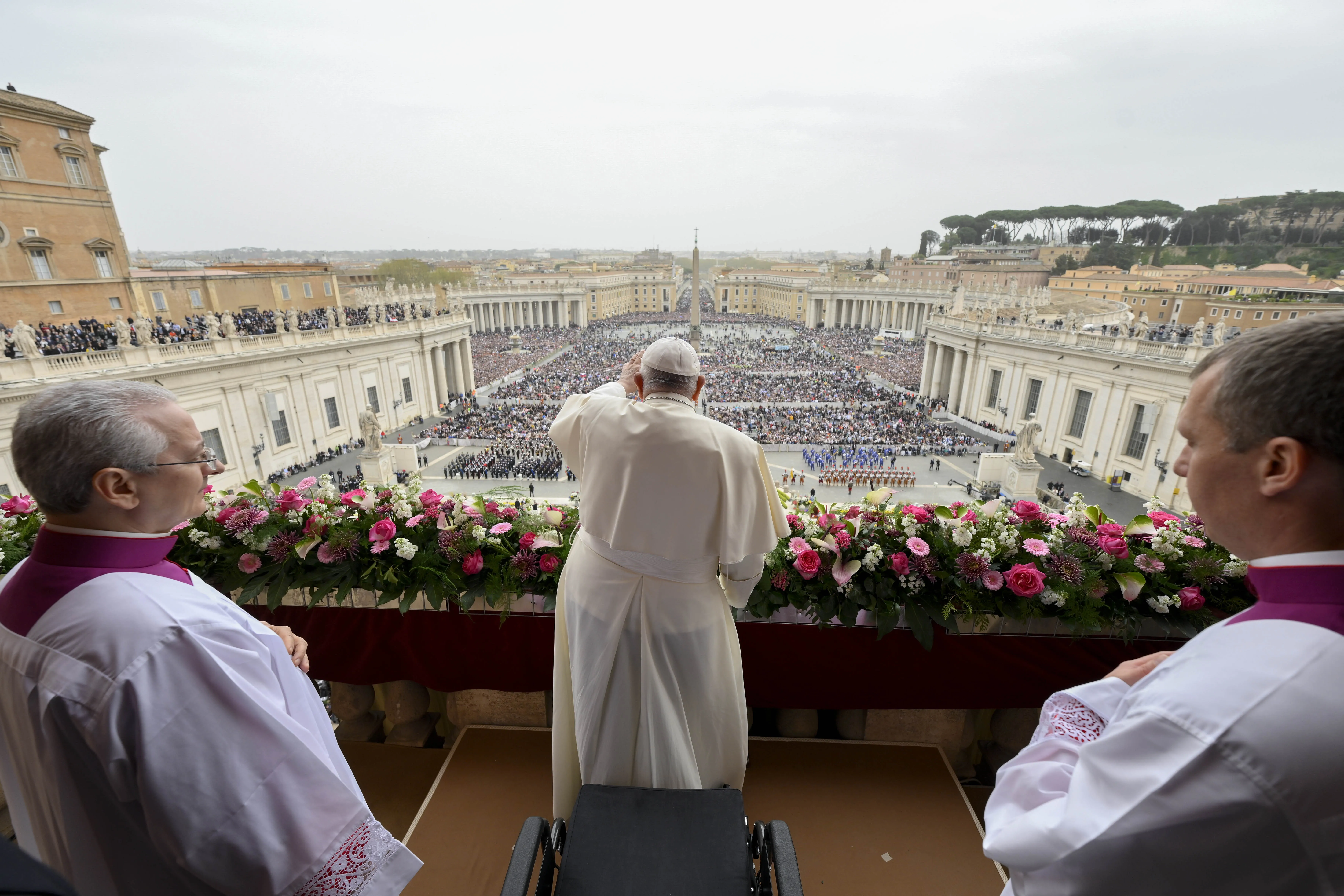
The pope asked the Lord to open paths of peace on the African continent, praying especially for “the suffering peoples in Sudan and in the entire region of the Sahel, in the Horn of Africa, in the region of Kivu in the Democratic Republic of the Congo, and in the province of Capo Delgado in Mozambique.”
He also prayed for the risen Lord to assist the people of Haiti, calling for “an end to the acts of violence, devastation, and bloodshed in that country, and that it can advance on the path to democracy and fraternity.”
Pope Francis encouraged the discussions taking place between Armenia and Azerbaijan, urging that with the support of the international community, they can “pursue dialogue, assist the displaced, respect the places of worship of the various religious confessions, and arrive as soon as possible at a definitive peace agreement.”
He prayed for reconciliation in Myanmar and for Christ to grant consolation and strength to the Rohingya people as they face “a grave humanitarian crisis.”
“On this day when we celebrate the life given us in the resurrection of the Son, let us remember the infinite love of God for each of us: a love that overcomes every limit and every weakness,” Pope Francis said.
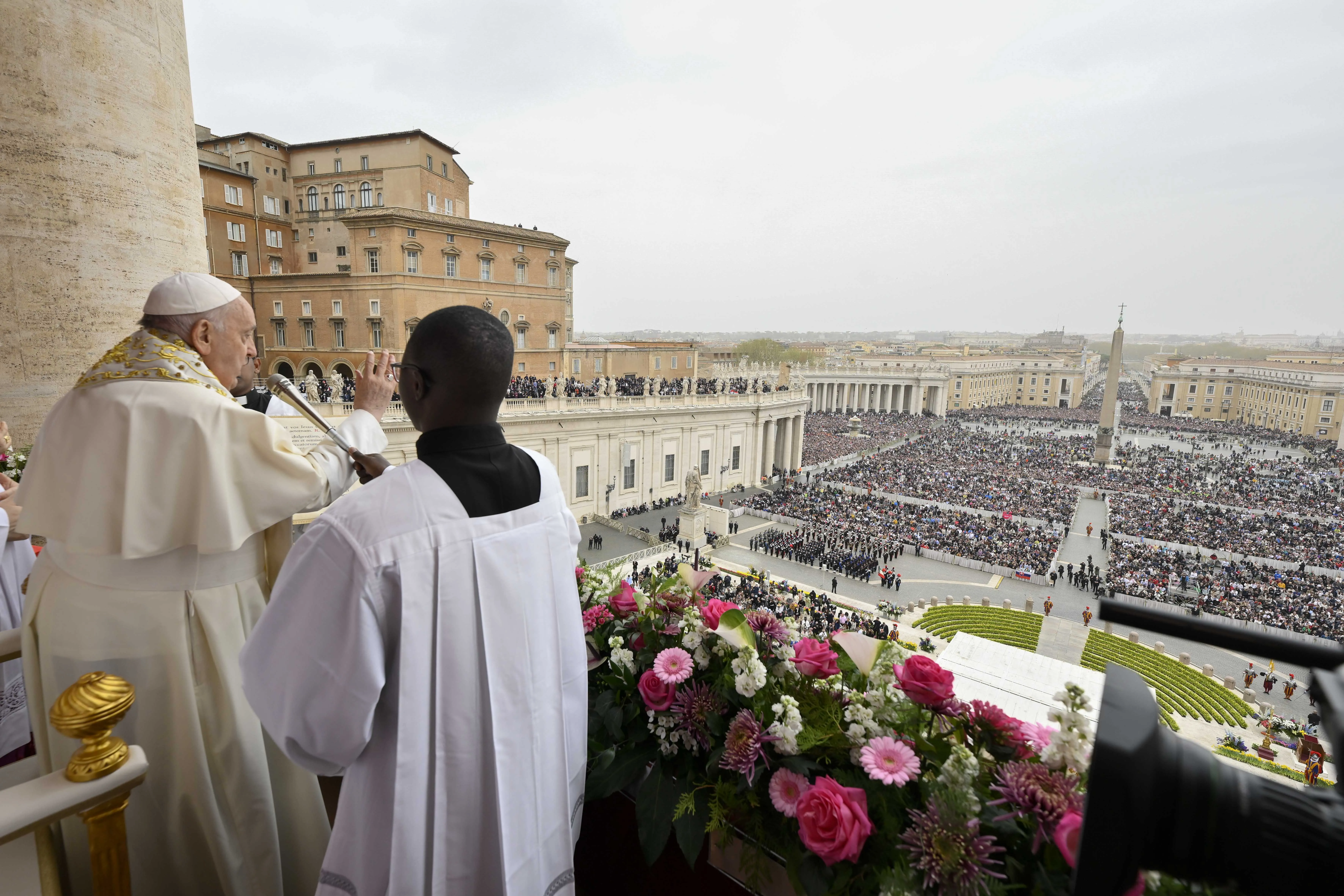
“And yet how much the precious gift of life is despised! How many children cannot even be born? How many die of hunger and are deprived of essential care or are victims of abuse and violence? How many lives are made objects of trafficking for the increasing commerce in human beings?”
“May the light of the Resurrection illuminate our minds and convert our hearts, and make us aware of the value of every human life, which must be welcomed, protected, and loved. A happy Easter to all!” he said.
📹 HIGHLIGHTS | Pope Francis gave the traditional Urbi et Orbi blessing after presiding over Mass in St. Peter’s Square on Easter Sunday 2024. Around 60.000 people attended the Mass, and 30.000 flowers and plants from the Netherlands decorated the square. pic.twitter.com/kLIvaQhIT5
— EWTN Vatican (@EWTNVatican) March 31, 2024
A plenary indulgence, or the remittance of temporal punishment due to sins that have already been forgiven, is granted to those who participate in the urbi et orbi blessing in person or through radio, television, or the internet.
The usual conditions for a plenary indulgence must be met: The individual must be in a state of grace and have complete detachment from sin. The person must also pray for the pope’s intentions and sacramentally confess their sins and receive Communion up to about 20 days before or after the indulgenced act.
Pope Francis celebrates Easter 2024: ‘Jesus Christ is risen’
Posted on 03/31/2024 10:15 AM (CNA Daily News - Vatican)
 Pope Francis presides over Easter Sunday Mass in St. Peter's Square on March 31, 2024. / Credit: Vatican Media
Pope Francis presides over Easter Sunday Mass in St. Peter's Square on March 31, 2024. / Credit: Vatican Media
Vatican City, Mar 31, 2024 / 08:15 am (CNA).
Pope Francis presided over Mass in St. Peter’s Square on Easter Sunday 2024 before giving the traditional urbi et orbi blessing in the presence of approximately 60,000 people.
On a warm and windy Easter Sunday at the Vatican, Pope Francis proclaimed: “Jesus Christ is risen! He alone has the power to roll away the stones that block the path to life. He, the living One, is himself that path. He is the Way.”
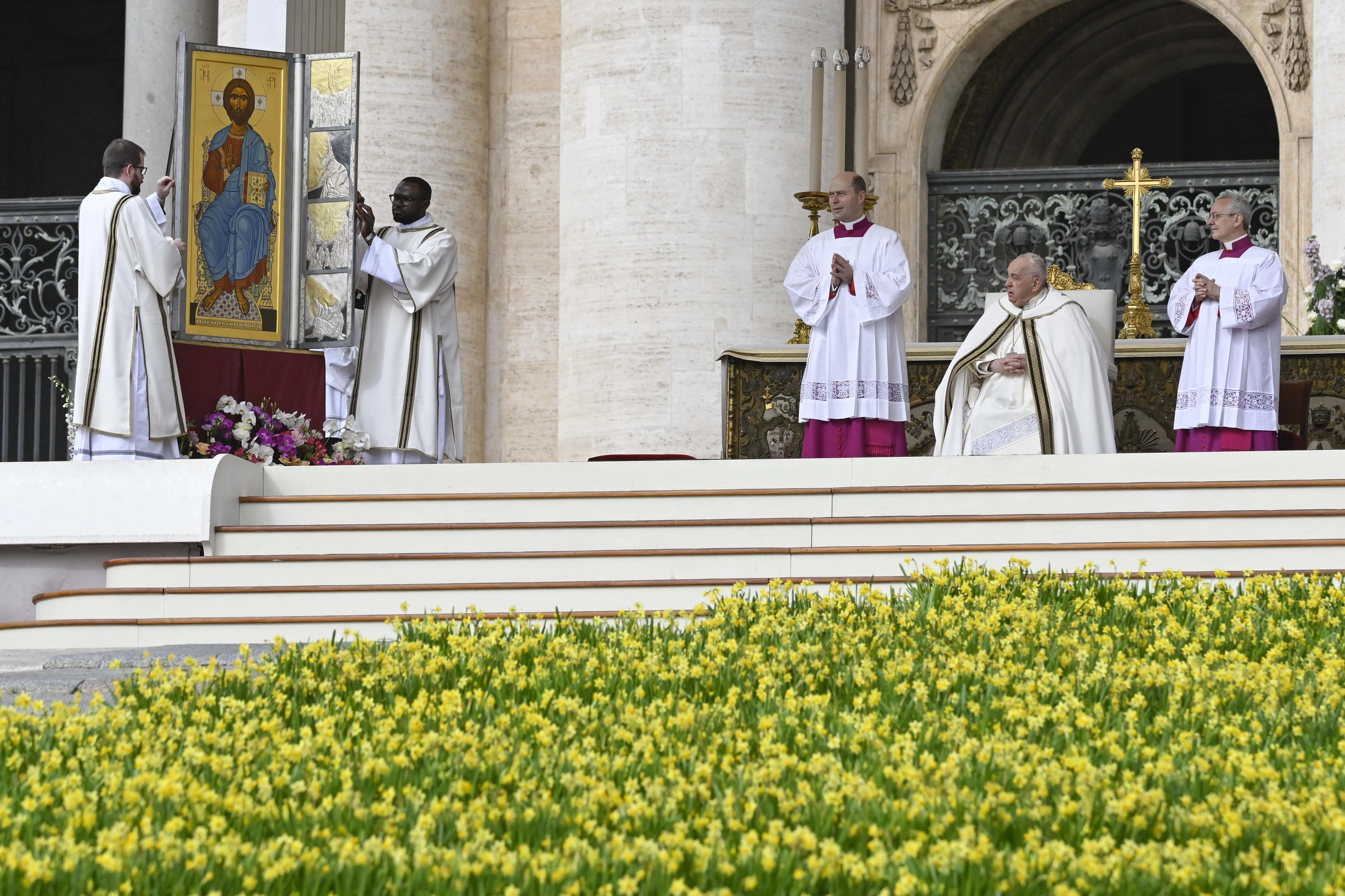
“Only the risen Christ, by granting us the forgiveness of our sins, opens the way for a renewed world,” the pope added.
Speaking from the central balcony of St. Peter’s Basilica in his urbi et orbi blessing, Pope Francis said that “today throughout the world there resounds the message proclaimed 2,000 years ago from Jerusalem: ‘Jesus of Nazareth, who was crucified, has been raised!’”
St. Peter’s Square was adorned with an array of over 21,000 flowers and plants from the Netherlands.
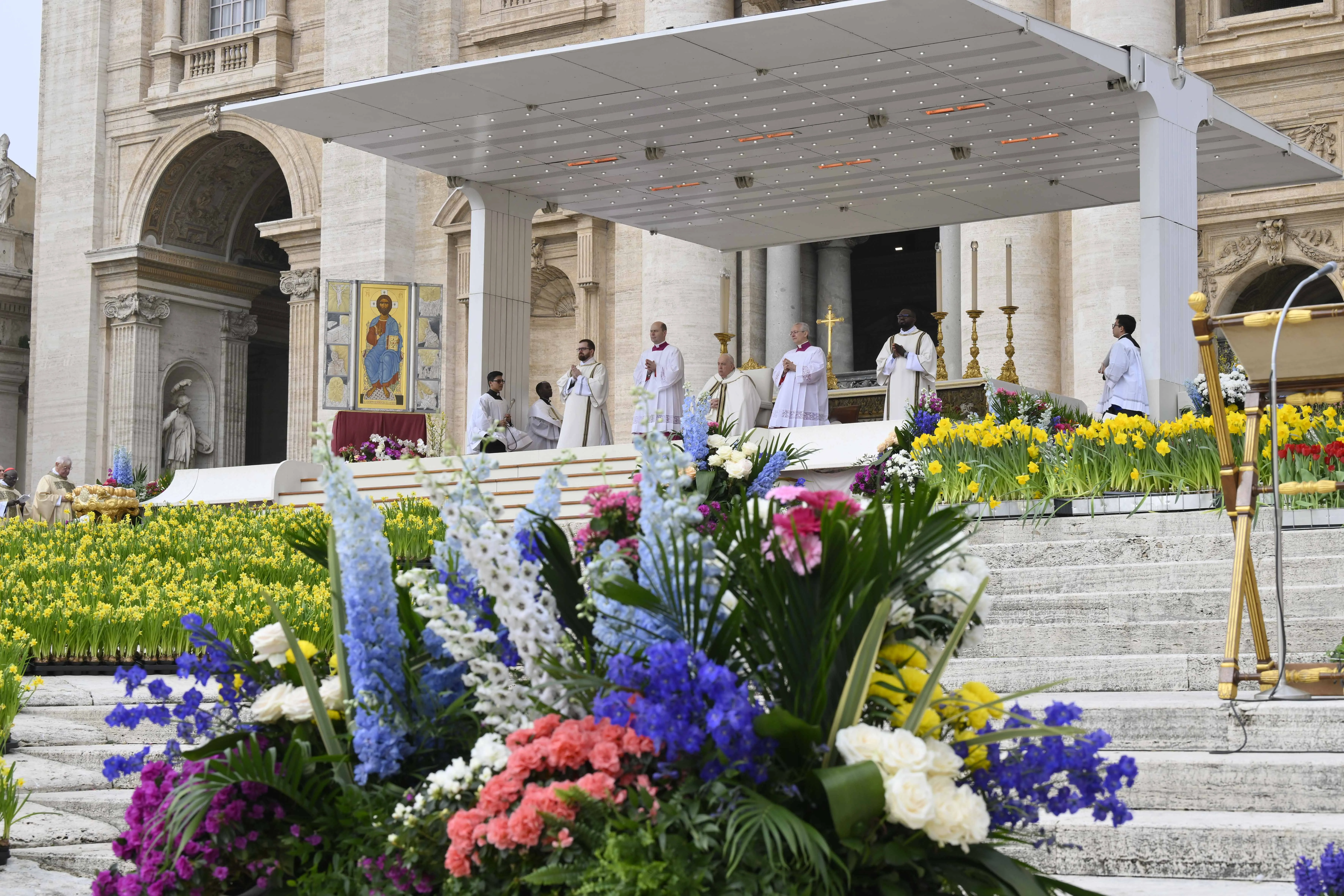
Three hundred priests, 18 bishops, and 34 cardinals concelebrated the Easter Sunday Mass on March 31. Cardinal Giovanni Battista Re celebrated at the altar due to Francis’ difficulty walking and standing.
The Gospel reading, John 20:1-9, was proclaimed in Latin and Greek. The passage recounts the moment in which Mary Magdalene and the apostles Peter and John found the empty tomb after Jesus’ resurrection.
Christ is Risen! Alleluia!
— Courtney Mares (@catholicourtney) March 31, 2024
Easter hymns of joy from the Vatican: pic.twitter.com/USjIomFVwV
As is his custom, Francis did not give a homily after the Gospel but stayed a few moments in silent prayer. Pope Francis gave a homily at the Easter Vigil Mass, which can be read here.
The pope also participated in the “Resurrexit,” an ancient rite honoring an icon of the Holy Savior. At the conclusion of the liturgy, Pope Francis rode through St. Peter’s Square on the popemobile greeting enthusiastic pilgrims who waved flags and cheered.
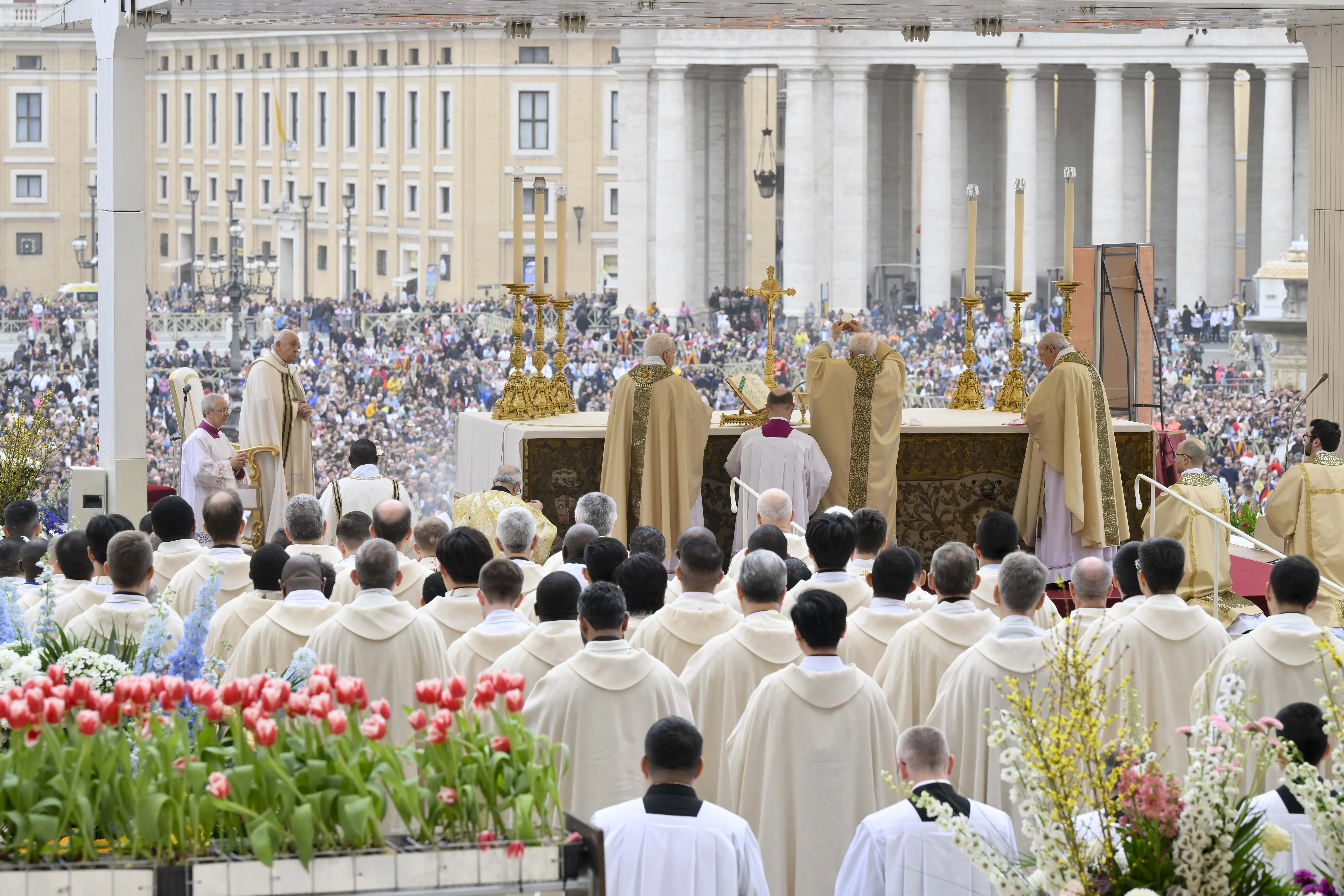
In his urbi et orbi message following the Mass, the pope reflected on the “amazing discovery of Easter morning” as the women discovered an empty tomb.
“The tomb of Jesus is open and it is empty! From this, everything begins anew!” Pope Francis said.
“A new path leads through that empty tomb: the path that none of us but God alone could open: the path of life in the midst of death, the path of peace in the midst of war, the path of reconciliation in the midst of hatred, the path of fraternity in the midst of hostility.”
Pope Francis prayed for peace in Israel, Palestine, Ukraine, and other parts of the world suffering from war and violence.
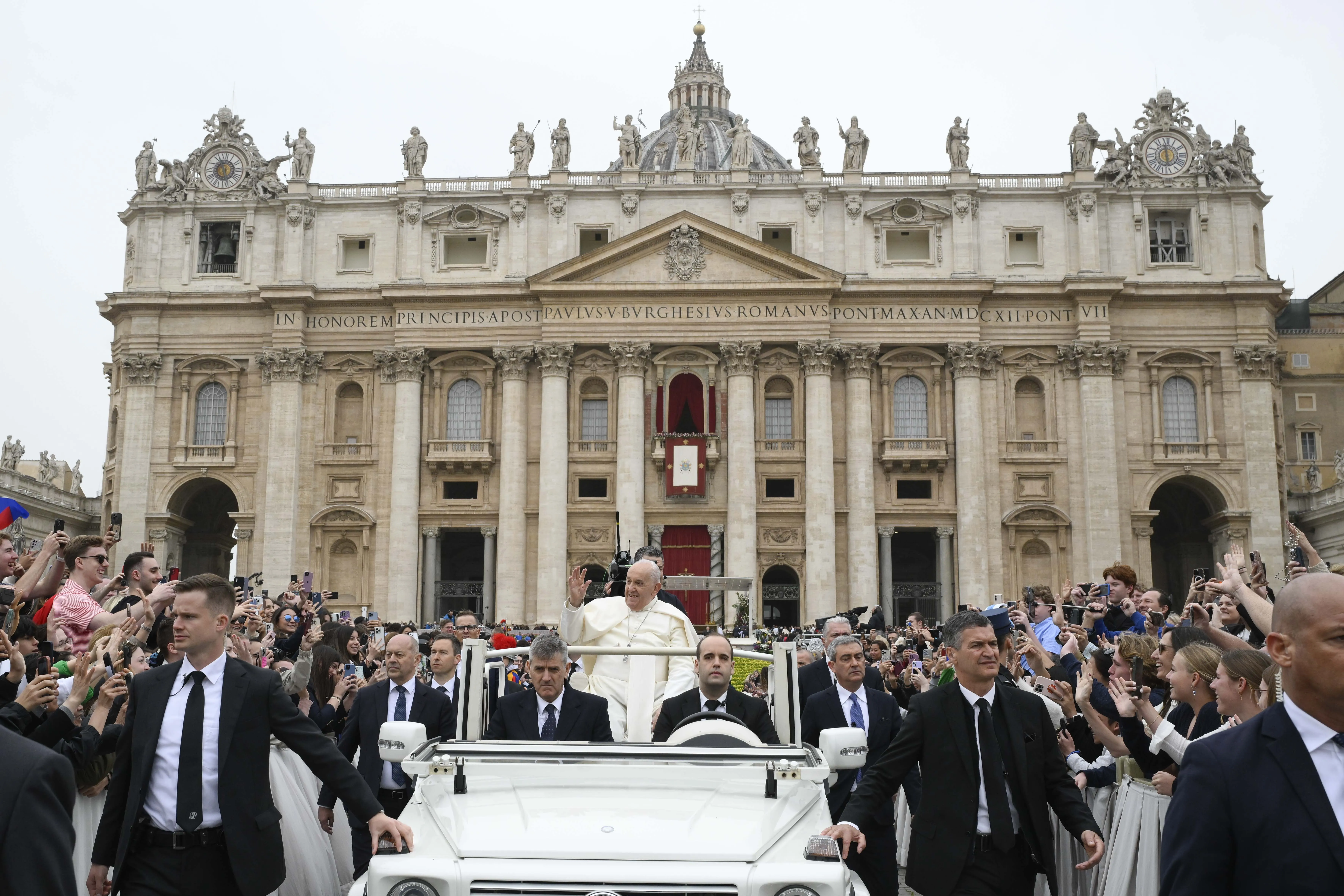
“On this day when we celebrate the life given us in the resurrection of the Son, let us remember the infinite love of God for each of us: a love that overcomes every limit and every weakness,” he said.
“And yet how much the precious gift of life is despised! How many children cannot even be born? How many die of hunger and are deprived of essential care or are victims of abuse and violence? How many lives are made objects of trafficking for the increasing commerce in human beings?”
“May the light of the Resurrection illuminate our minds and convert our hearts, and make us aware of the value of every human life, which must be welcomed, protected, and loved. A happy Easter to all!” Pope Francis said.
Pope Francis skips Via Crucis in Rome while tens of thousands pray his meditations
Posted on 03/29/2024 21:00 PM (CNA Daily News - Vatican)
 Tens of thousands gather outside of the Colosseum in Rome for the Via Crucis, the Way of the Cross, on Good Friday, March 29, 2024. / Credit: Daniel Ibañez/CNA
Tens of thousands gather outside of the Colosseum in Rome for the Via Crucis, the Way of the Cross, on Good Friday, March 29, 2024. / Credit: Daniel Ibañez/CNA
Vatican City, Mar 29, 2024 / 19:00 pm (CNA).
In an apparent last-minute decision, Pope Francis skipped the Way of the Cross ceremony held at Rome’s Colosseum on Friday to safeguard his health ahead of the upcoming liturgies on Saturday and Easter Sunday.
“To conserve his health in view of tomorrow’s vigil and the holy Mass on Easter Sunday, Pope Francis will follow the Via Crucis at the Colosseum this evening from Casa Santa Marta,” a statement from the Holy See Press stated.
The news arrived just as the event was scheduled to begin, where two men were seen carrying away the papal chair, where Rome’s mayor Roberto Gualtieri was seen standing in the background. Earlier in the day, Pope Francis presided over the Good Friday liturgy in St. Peter’s Basilica.
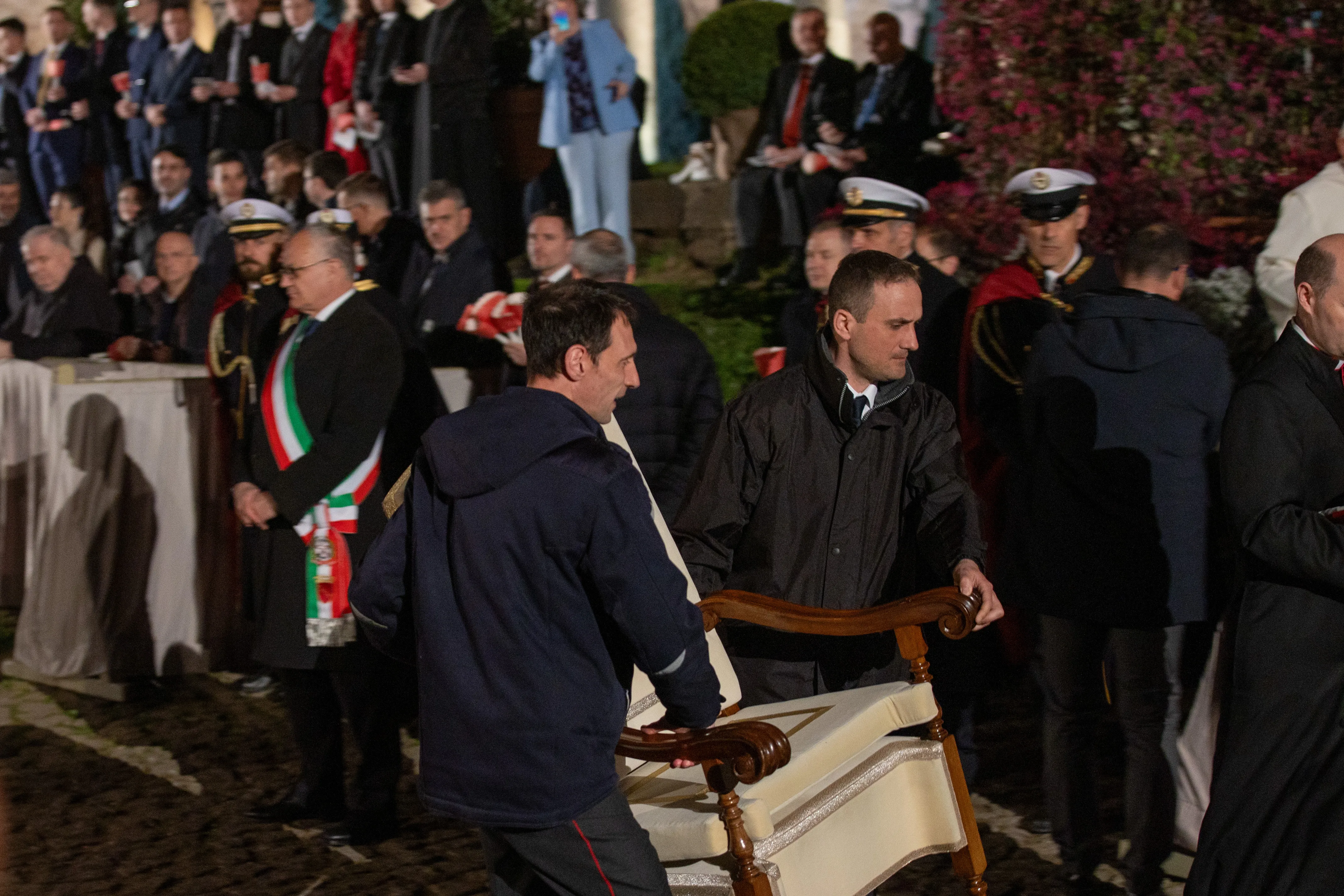
This is the second consecutive year that the now 87-year-old pontiff has skipped the ceremony, coming as his increasingly fragile health has become a central concern.
The Stations of the Cross started promptly at 9:15 p.m. Rome time, with the rest of the program unchanged. There were an estimated 25,000 people in attendance, according to the Holy See Press Office.
In stark contrast to the dark Roman sky, the Colosseum was dramatically illuminated by a series of candles while the adjacent ruins of the Roman Forum soared under spotlights.
This year’s meditations were written by Pope Francis, a first in his pontificate, and were based on the theme “In Prayer with Jesus on the Way of the Cross,” with each station’s mediation centered on the experience of Jesus, which the pope linked to contemporary issues and life’s daily challenges.
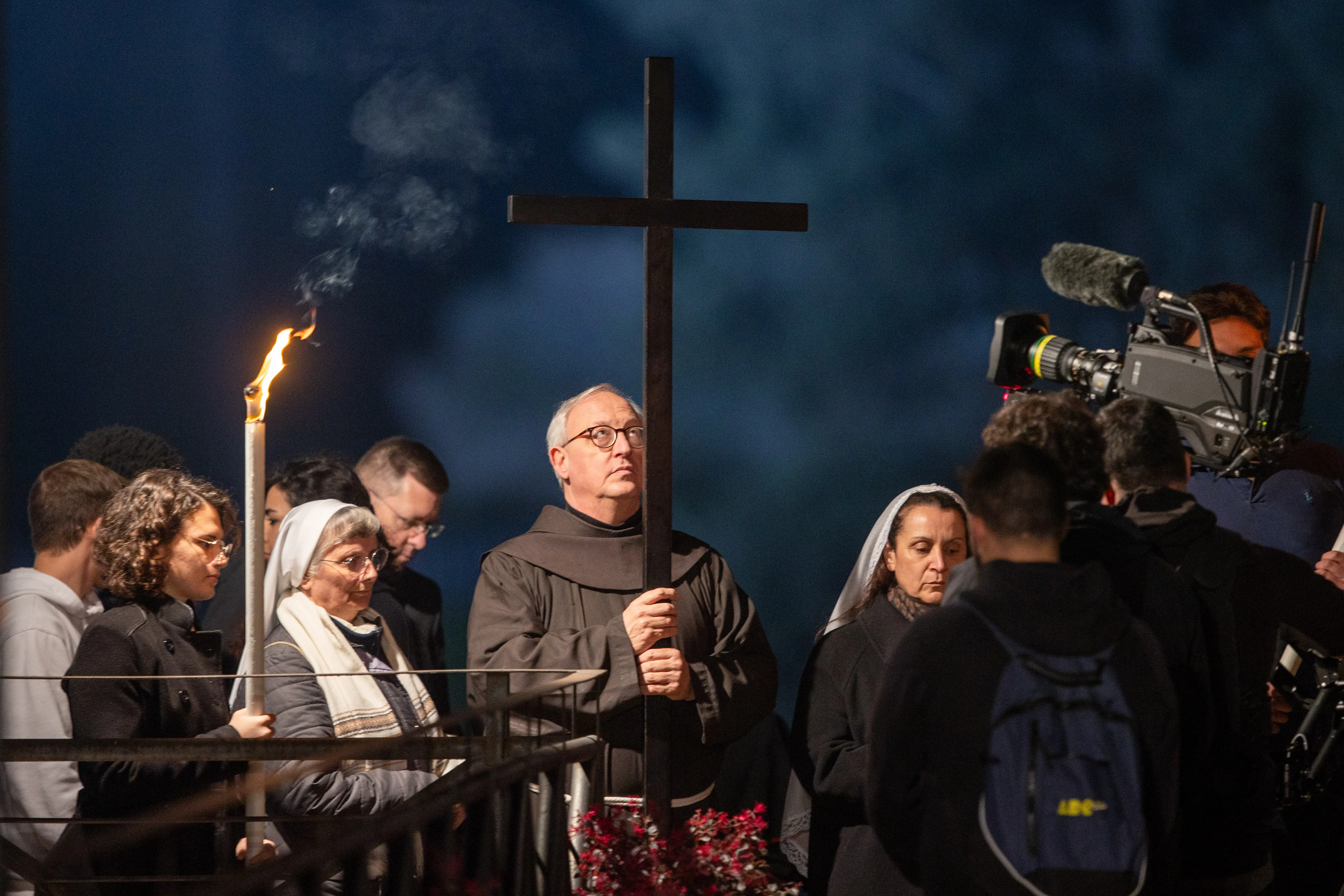
“Jesus, you are life itself, and now you are sentenced to death. You are truth itself, and now you are falsely put on trial,” read the pope’s reflection for the first Station of the Cross.
“Yet that silence is itself pregnant: It is prayer, meekness, forgiveness; it is a means of redeeming evil, a means of converting your passion into a sacrificial gift.”
Walking around the interior of the elliptical amphitheater in the solemn procession, the cross was carried by different individuals, while Cardinal Angelo De Donatis (the pope’s vicar for the Diocese of Rome) and several other prelates followed closely behind.
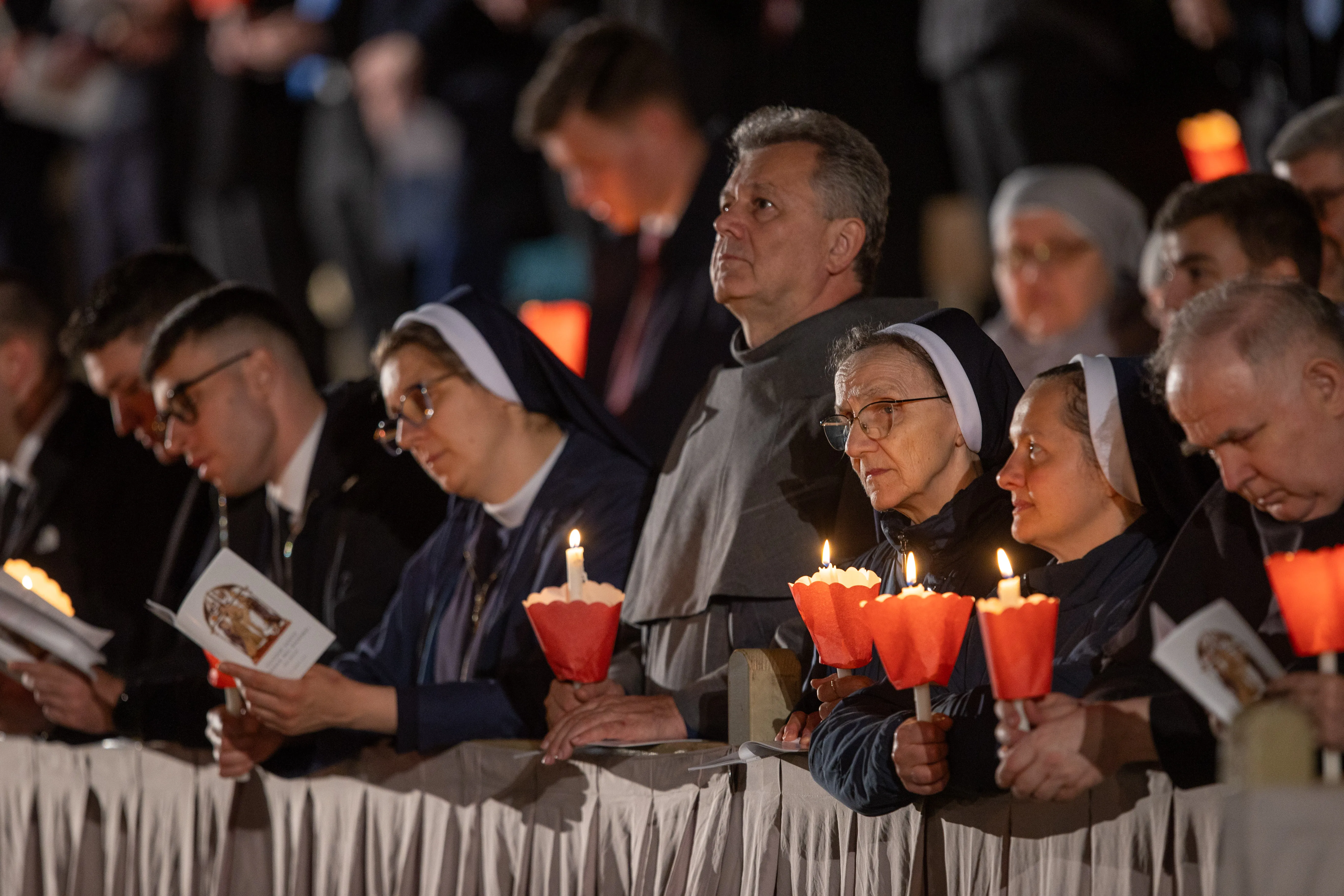
At the second station the meditation, addressed to Christ, stated: “You want us to lay upon your shoulders all our problems and needs, because you want us to find freedom and love in you. Thank you, Jesus. I unite my cross to yours, I bring you my weariness and my cares, I cast upon you every burden of my heart.”
“In your vulnerability, you have shown us the triumph of your love. You have taught us that to love means to reach out to those who may be ashamed to ask for our help. In this way, weakness becomes an opportunity for growth,” the pope’s meditation followed as the cross was carried by a disabled woman.
In one particularly evocative moment, at the ninth station, the cross was carried by a group of migrants while the pope’s meditation linked their struggles and social alienation to that of Jesus.
“You [Jesus] too were imprisoned; you too were a stranger, led outside the city to be crucified. You too were naked, stripped of your clothes. You too were sick and wounded; on the cross, you too were thirsty and hungered for love. Teach me to see you in those who suffer, for you are there, and in those stripped of their dignity, demeaned by the arrogance, injustice, and power of those who exploit the poor amid general indifference.”
The ceremony concluded outside of the Colosseum, when De Donatis delivered the final blessing and Invocations to the Holy Name of Jesus. The 15-stanza prayer ended simply, yet powerfully: “Jesus, let me say one last word to you, and to say it over and over again: Thank you! Thank you, my Lord and my God!”
PHOTOS: Pope Francis celebrates Good Friday liturgy at the Vatican
Posted on 03/29/2024 17:20 PM (CNA Daily News - Vatican)
 Pope Francis celebrates the Passion of the Lord on Good Friday in St. Peter's Basilica in Rome. March 29, 2024. / Credit: Daniel Ibañez/CNA
Pope Francis celebrates the Passion of the Lord on Good Friday in St. Peter's Basilica in Rome. March 29, 2024. / Credit: Daniel Ibañez/CNA
Vatican City, Mar 29, 2024 / 15:20 pm (CNA).
During the Good Friday liturgy at the Vatican, presided over by Pope Francis, the papal preacher reflected on the triumph of the cross, noting that it is an event that changed the universal perception of God’s omnipotence, revealing his humility.
“The true omnipotence of God is the total powerlessness of Calvary,” Cardinal Raniero Cantalamessa, OFM Cap, said during his homily.
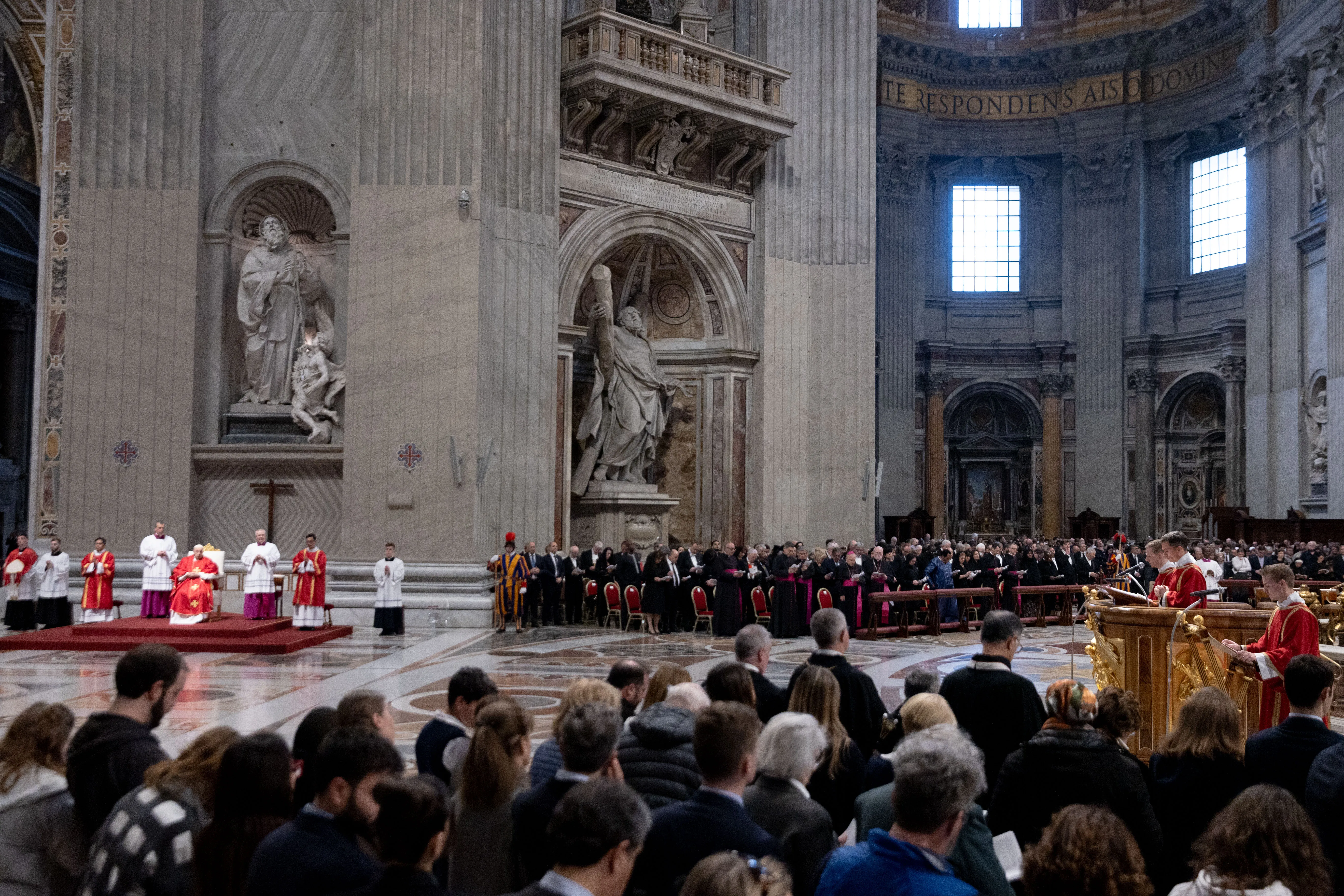
At approximately 5 p.m. Rome time, Pope Francis made his way into St. Peter’s Basilica in a wheelchair vested in a red chasuble. Cast against the backdrop of complete and palpable silence, the Holy Father paused in meditation before the papal altar underneath Bernini’s baldacchino (covered in scaffolding for its restoration), while the congregation knelt.
For the past several years the pope has been unable to lay prostrate due to his fragile health, which includes persistent knee problems and several bouts of pulmonary inflammation.
After the chanting of the Passion from the Gospel of John, Cantalamessa — who was made a cardinal in 2020 after more than 40 years as preacher of the Papal Household — opened his homily reflecting on Christ’s self-affirmation of “I am,” words he said come without any qualification and carry “an absolute, metaphysical significance” and is an “unprecedented novelty.”
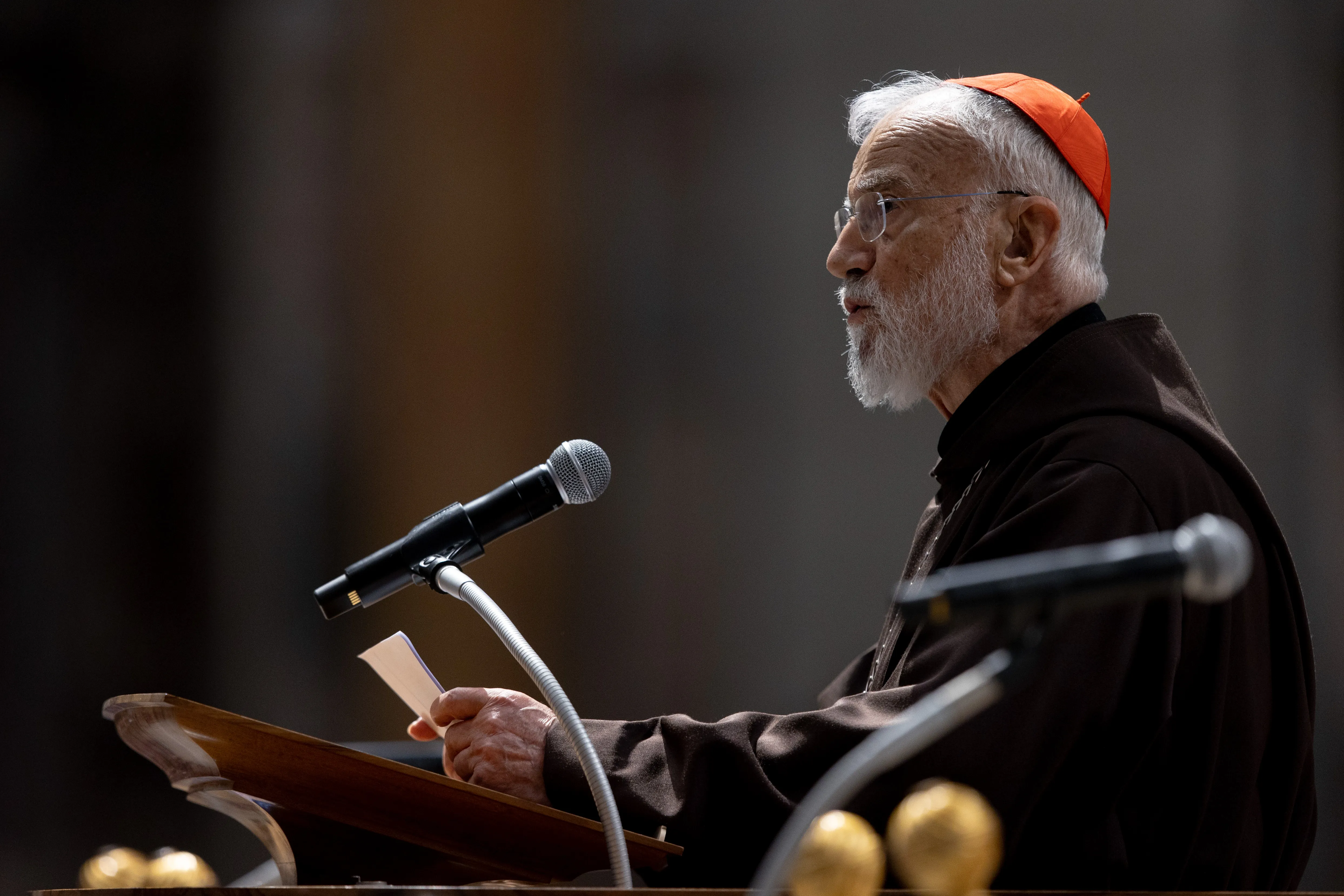
The cardinal stressed that this new paradigm can only be understood by looking at Christ’s preceding words heard in the Passion: “When you have lifted up the Son of Man.”
Observing that “to be lifted up” refers to the crucifixion, the cardinal noted that the sum of these words express a “total reversal of the human idea of God,” revealing “the true face of God.”
“Jesus did not come to retouch and perfect the idea that men had of him but, in a certain sense, to overturn it and reveal the true face of God,” he said. “He humbly behaves in the glory of the resurrection as in the annihilation of Calvary. The concern of the risen Jesus is not to confuse his enemies but to immediately go and reassure his lost disciples and, before them, the women who had never stopped believing in him.”
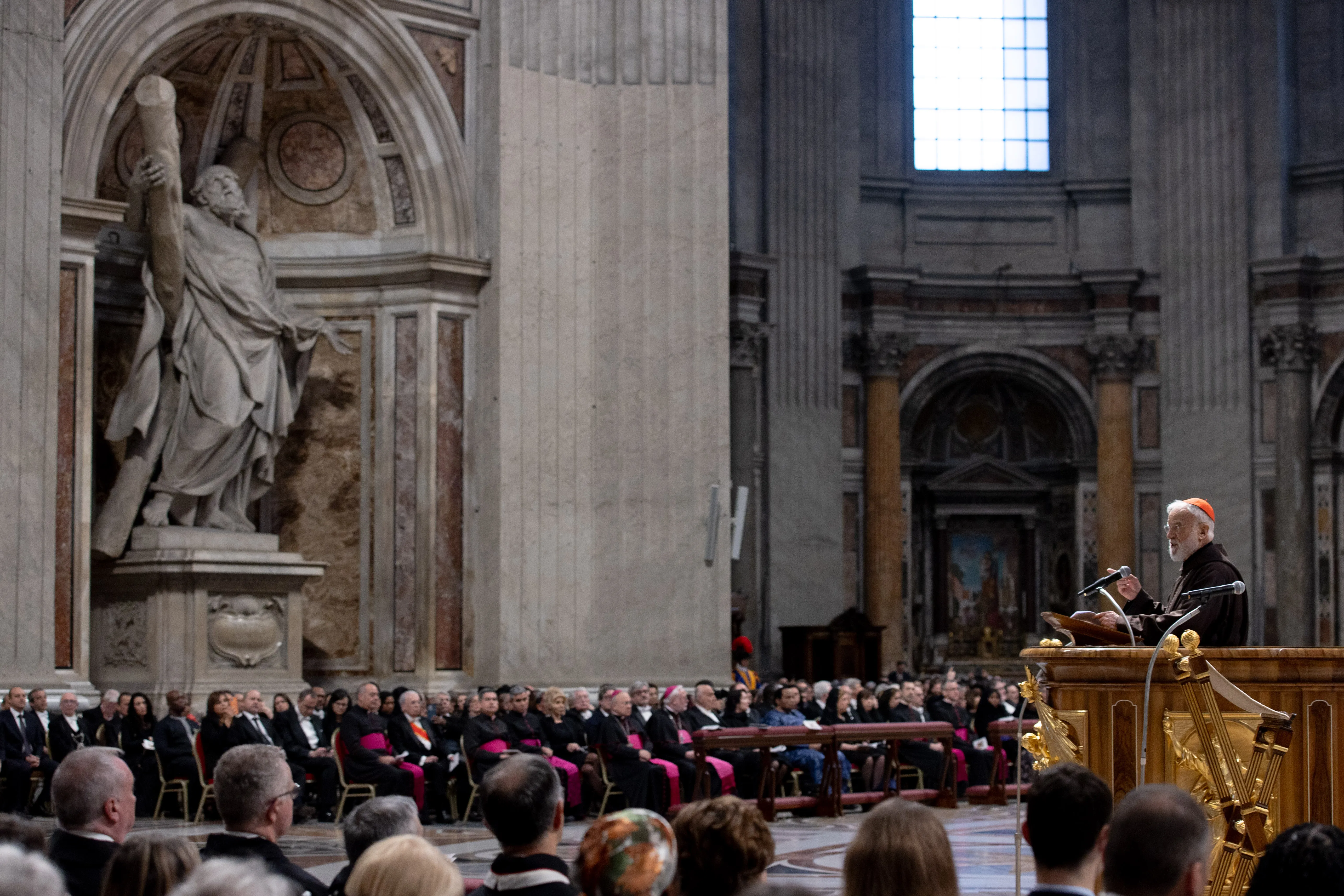
“Understood in this light,” Cantalamessa continued, “the word of Christ takes on a universal significance that challenges those who read it, in any era and situation, including ours.”
The cardinal warned not to conflate God’s omnipotence and the “definitive and irreversible triumph” of the cross with temporal triumphs, as God’s triumph showcases humility.
“It takes little power to show off,” the cardinal noted. “Instead, it takes a lot to step aside, to cancel. God is this limitless power of self-concealment.”
“The resurrection takes place in the mystery,” he continued. “As a resurrected one, Jesus appears only to a few disciples, out of the spotlight. With this he wanted to tell us that after suffering, we must not expect an external, visible triumph, like an earthly glory.”
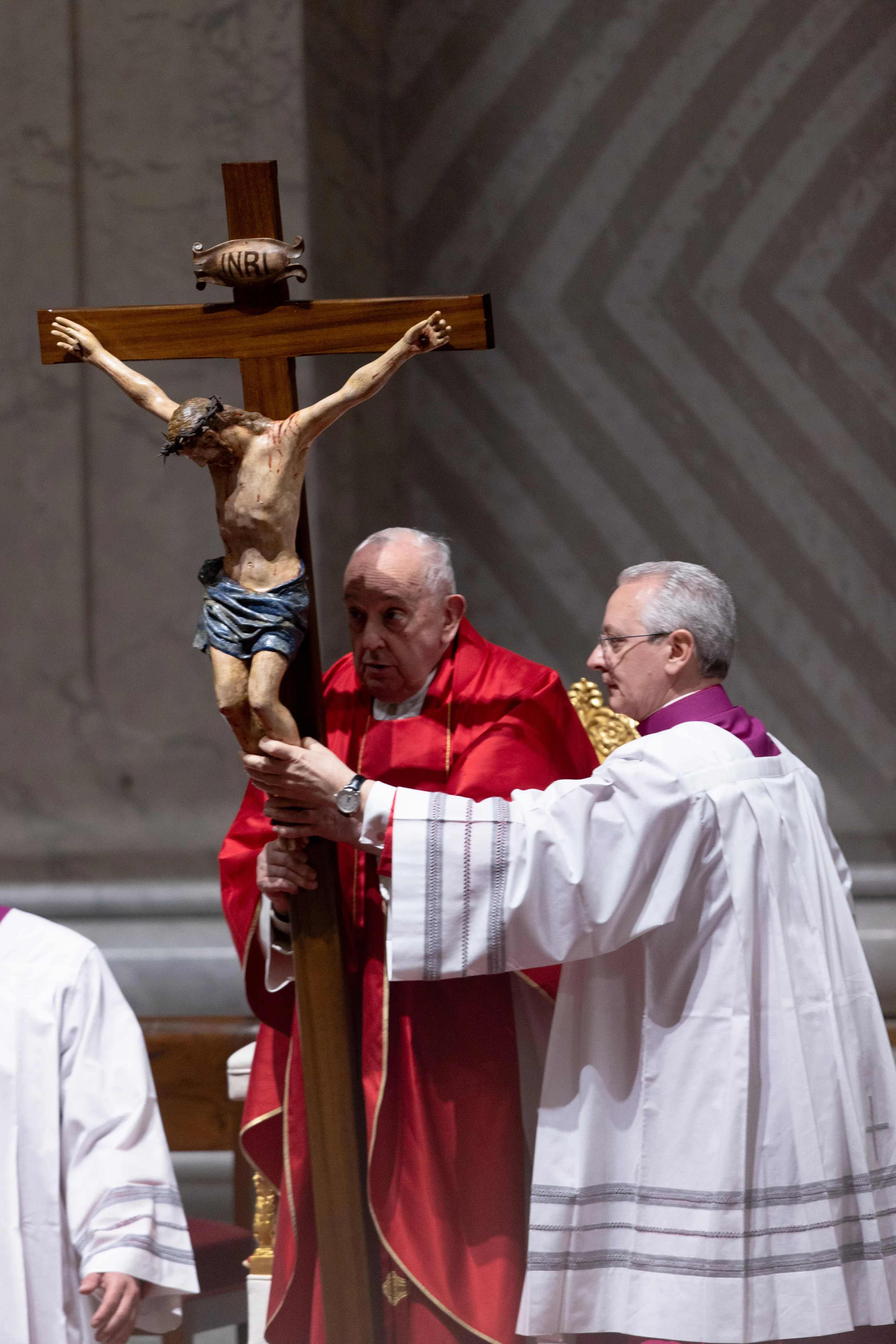
At the end of Cantalamessa’s homily, the faithful sat in a moment of deep silence and reflection. This was followed by the reading of the Oratio Universalis, the universal prayer also known as the Solemn Intercessions.
Then a deacon, flanked by two candle bearers, stopped at three separate points in the central nave of the basilica, proclaiming, with an increasing pitch, “Ecce lignum crucis” (“behold the wood of the cross”). After the third proclamation, the deacon, holding an unveiled crucifix, brought it to the papal chair for the pope’s veneration.
Once the crucifix was fixed in a central place, the Sistine Chapel Choir chanted the Improperia, or the Good Friday Reproaches, a series of antiphons sung in alternating manner between a cantor and the choir. The cardinals, who sat opposite the pope, filed in line to kneel before and kiss the crucifix.
After the final prayer over the people, the pope left the basilica just as he entered: solemn and in silence.
📹HIGHLIGHTS | On Good Friday, Pope Francis presided over the Celebration of the Lord's Passion in St. Peter's Basilica, one of the most beautiful liturgical traditions of the Catholic Church #HolyWeek2024 pic.twitter.com/LxX4XYZjoR
— EWTN Vatican (@EWTNVatican) March 29, 2024
Full text: Pope Francis’ Good Friday Way of the Cross meditations
Posted on 03/29/2024 12:10 PM (CNA Daily News - Vatican)
 Pope Francis presides over Ash Wednesday Mass at the Basilica of Santa Sabina in Rome on Feb. 14, 2024. / Credit: Vatican Media
Pope Francis presides over Ash Wednesday Mass at the Basilica of Santa Sabina in Rome on Feb. 14, 2024. / Credit: Vatican Media
Vatican City, Mar 29, 2024 / 10:10 am (CNA).
For the first time in his 11-year pontificate, Pope Francis has written his own spiritual meditations for Friday’s Via Crucis (Way of the Cross) in Rome.
The reflections are based on the theme “In Prayer with Jesus on the Way of the Cross” and center on “what Jesus experienced in that moment” at each station, the Holy See Press Office said earlier this week when announcing that the pope would offer his own meditations.
Here is the full text of the Via Crucis meditations for Good Friday, March 29, 2024:
STATIONS OF THE CROSS 2024
In prayer with Jesus on the Way of the Cross
Introduction:
Lord Jesus, as we contemplate your cross, we realize that you sacrificed yourself completely for our sake. We now take this time to be with you. We want to spend it in closeness to you. On the way from Gethsemane to Calvary, you never stopped praying. In this Year of Prayer, we accompany you on your own journey of prayer.
From the Gospel according to Mark: “They went to a place called Gethsemane… Jesus took with him Peter and James and John, and began to be distressed and agitated. He said to them, ‘Remain here and keep awake.’ Going a little farther, he threw himself on the ground and prayed… ‘Abba, Father, for you all things are possible; remove this cup from me; yet not what I want but what you want.’ He came and found them sleeping; and he said to Peter, ‘Could you not keep awake one hour?’” (Mk 14:32-37).
Lord, you prepared for every day of your life with prayer, and now, in Gethsemane, you prepare for your Passover. Abba, Father, for you all things are possible, you say, for prayer is before all else dialogue and intimacy, yet at the same time struggle and supplication: Remove this cup from me! Prayer too is entrustment and offering: Yet not what I want, but what you want. In your prayer, you passed through the narrow door of our human suffering and experienced it fully. You were “distressed and agitated” (Mk 14:33), fearful in the face of death, crushed beneath the burden of our sin, and oppressed by untold grief. Yet in the midst of this struggle, you prayed “more earnestly” (Lk 22:44), and in this way turned your bitter anguish into a sacrifice of love.
Of us, you asked only one thing: to remain with you and to keep awake. You did not ask something impossible, but simply closeness. How many times, though, have I strayed far from you! How many times, like the disciples, rather than keeping awake, have I instead fallen asleep! How many times have I failed to find the time or the desire to pray, whether from weariness, distraction, or dullness of mind and heart! Lord Jesus, say once more to me and to us, your Church: “Get up and pray” (Lk 22:46). Rouse us, Lord! Awaken our hearts from their lethargy, for today too — today above all — you count on our prayer.
First station: Jesus is condemned to death
“Then the high priest stood up before them and asked Jesus, ‘Have you no answer? What is it that they testify against you?’ But he was silent and did not answer… Pilate again asked him, ‘Have you no answer? See how many charges they bring against you.’ But Jesus made no further reply, so that Pilate was amazed” (Mk 14:60-61; 15:4-5).
Jesus, you are life itself, and now you are sentenced to death. You are truth itself, and now you are falsely put on trial. Why don’t you protest? Why don’t you speak up and defend yourself? Why don’t you confound the learned and powerful, as you did so often and so well? Your reaction troubles us, Jesus: at the decisive moment, you choose not to speak; you remain silent. Because the more potent evil is, the more radical is your response. And that response is silence. Yet that silence is itself pregnant: it is prayer, meekness, forgiveness; it is a means of redeeming evil, a means of converting your passion into a sacrificial gift. Jesus, I realize how little I know you, for I find it hard to understand your silence. Amid the frantic pace of my life, my absorption with the things of this world, my struggle to keep up with others or my need to be at the center of attention, I fail to find time to stop and be with you. To allow you, Word of the Father, ever silently at work, to act in my life. Jesus, I find your silence troubling. It makes me realize that prayer is not about lips that move but a heart that listens, for to pray is to become open to your word, and to adore your presence.
Let us pray together and say:
Speak to my heart, Jesus.
You, who respond to evil with good,
Speak to my heart, Jesus.
You, who calm rage with meekness,
Speak to my heart, Jesus.
You, who detest gossip and complaints,
Speak to my heart, Jesus.
You, who peer into the depths of my heart,
Speak to my heart, Jesus.
You, who love me more than I do myself,
Speak to my heart, Jesus.
Second station: Jesus carries his cross
“He bore our sins in his body on the cross, so that, free from sins, we might live for righteousness; by his wounds you have been healed” (1 Pt 2:24).
Jesus, we too have our crosses to bear. At times, they are heavy indeed: illness, an accident, the death of a dear one, disappointment in love, a child gone astray, a lost job, a hurt that will not heal, a failed project, the frustration of yet another hope… Jesus, how do I pray in those situations? What am I to do when I feel crushed by life, heavy of heart, under pressure, and lacking the strength to go on? Your answer is an invitation: “Come to me, all you that are weary and are carrying heavy burdens, and I will give you rest” (Mt 11:28). “Come to me.” Yet I take refuge in myself: I brood, I nurse my griefs, I wallow in negativity. Come to me. Saying this was not enough; you came to us and you took our cross upon your shoulders to lighten its weight. You want us to lay upon your shoulders all our problems and needs, because you want us to find freedom and love in you. Thank you, Jesus. I unite my cross to yours, I bring you my weariness and my cares, I cast upon you every burden of my heart.
Let us pray together and say:
I come to you, Lord.
With the story of my life,
I come to you, Lord.
With all my cares,
I come to you, Lord.
With all my frailty and shortcomings,
I come to you, Lord.
With all my fears,
I come to you, Lord.
With complete trust in your love for me,
I come to you, Lord.
Third station: Jesus falls the first time
“Very truly, I tell you, unless a grain of wheat falls into the earth and dies, it remains just a single grain; but if it dies, it bears much fruit” (Jn 12:24).
Jesus, you have fallen. What are you thinking, how are you praying, prostrate in the dust? Above all, what gives you the strength to pick yourself up again? As you lie face-down on the ground, unable to see the sky above, I imagine you praying in your heart: Father, who art in heaven. The loving gaze of the Father is the source of your strength. At the same time, I imagine that, as you kiss the cold dry ground, you think of man, formed from the dust of the earth. You think of all of us whom you hold in your heart, and you repeat once again the words of your testament: “This is my body, which is given for you” (Lk 22:19). The Father’s love for you and your love for us: that love is the force that makes you get up and go forward. For those who love do not stay down but start over again; those who love do not tire, but keep going; those who love take wing and fly. Jesus, I keep asking you for many things, but there is only one thing that I need, and that is the ability to love. I will fall often in life, but with your love, I will be able to pick myself up and go forward, even as you did. For you know what it means to fall. Your life was a constant descent for our sake: from God to man, from man to slave, from slave to crucifixion and the tomb. Like the seed that falls to the ground and dies, you came down in order to lift us up from the earth and bring us to heaven. You, who raise us from the dust and give us new hope, grant me the strength to love and to begin anew.
Let us pray together and say:
Jesus, give me the strength to love and begin anew.
When I am overcome by disappointment,
Jesus, give me the strength to love and begin anew.
When I am weighed down by the judgments of others,
Jesus, give me the strength to love and begin anew.
When things go wrong and I lose my patience,
Jesus, give me the strength to love and begin anew.
When I feel that I cannot go on,
Jesus, give me the strength to love and begin anew.
When I fear that nothing will ever change,
Jesus, give me the strength to love and begin anew.
Fourth station: Jesus meets his mother
“When Jesus saw his mother and the disciple whom he loved standing beside her, he said to the disciple, ‘Here is your mother.’ And from that hour the disciple took her into his own home” (Jn 19:26-27).
Jesus, your disciples abandoned you, Judas betrayed you and Peter denied you. You are left alone with your cross. Yet your Mother is there for you. She needs no words, it is enough to look into her eyes that understand and share in your suffering. Jesus, in Mary’s eyes, bright with tears, you see mirrored the tender love, the warm caresses and the loving embrace that surrounded and sustained you from your earliest years. A mother’s eyes remind us too of all the goodness we have known. All of us need a mother to bring us into the world, but also to help us find our proper place in the world. You know this, and, from the cross, you give us your own mother. Here is your mother, you say to your disciple and to each of us. After the gift of the Eucharist, you gave us Mary as your final, parting gift. Jesus, on your journey you drew strength from the memory of her love; my journey too needs to be grounded in the memory of all the goodness I have known. Yet I realize how little room I make in my prayer for grateful remembrance. My prayer is all too hurried, a quick list of things I need for today and tomorrow. Mary, stop me from rushing. Help me to recall and cherish the graces I have received, to remember God’s forgiveness and his blessings, to revive my first love, to savor anew the wonders of his providence, and to shed tears of gratitude.
Let us pray together and say:
Lord, renew in me the memory of your love.
When the wounds of the past are reopened,
Lord, renew in me the memory of your love.
When I lose my sense of reality,
Lord, renew in me the memory of your love.
When I take for granted all the gifts I have received,
Lord, renew in me the memory of your love.
When I lose sight of the gift that I am,
Lord, renew in me the memory of your love.
When I neglect to give you thanks,
Lord, renew in me the memory of your love.
Fifth station: Jesus is helped by Simon of Cyrene
“As the soldiers led him away, they seized a man, Simon of Cyrene, who was coming from the country, and they laid the cross on him, and made him carry it behind Jesus” (Lk 23:26).
Jesus, how often in the face of life’s challenges we think that we can go it alone! How hard we find it to ask for help, lest we give the impression that we are not up to the task! What pains we take to put ourselves in the best light, to put on a good show! It is not easy to trust others, and even less to depend on them. Yet those who pray know their needs, and you, Jesus, in your own prayer, knew what it meant to entrust yourself completely. So you did not refuse the help offered by the man from Cyrene. You allowed this simple man, a farmer returning from the fields, to witness your weakness. Thank you, Jesus, because, by letting yourself be helped in your need, you have shown us the image of a God who is not distant and untouchable. In your vulnerability, you have shown us the triumph of your love. You have taught us that to love means to reach out to those who may be ashamed to ask for our help. In this way, weakness becomes an opportunity for growth. That is what happened to Simon of Cyrene. Your weakness changed his life; one day he will realize that he helped his Savior and was redeemed by the very cross he carried. Jesus, grant that my life too may change. Help me lower my defenses and allow you to love me in those places where I have fallen most grievously.
Let us pray together and say:
Heal me, Jesus.
From the presumption of self-sufficiency,
Heal me, Jesus.
From thinking that I can do without you or anyone else,
Heal me, Jesus.
From my obsession with being perfect,
Heal me, Jesus.
From my reluctance to entrust my frailty to you,
Heal me, Jesus.
From hurrying past the needy whom I encounter on my way,
Heal me, Jesus.
Sixth station: Jesus is comforted by Veronica, who wipes his face
“Blessed be God, the Father of mercies and the God of all consolation, who consoles us in all our affliction, that we may be able to console those who are in any affliction… For just as the sufferings of Christ are abundant for us, so also our consolation is abundant through Christ” (2 Cor 1:3-5).
Jesus, crowds of people witness the brutal spectacle of your execution. Without knowing you or knowing the truth, they make judgments, they cast aspersions, they mock you and condemn you. The same thing happens even now, Lord, without the need for a gruesome parade: all it takes is a keyboard to spew insults and condemnation. Yet amid the roar of the crowd, a woman makes her way to Jesus. She says nothing; she acts. She does not rant and rail; she shows mercy and compassion. She goes against the tide: alone, with the courage of compassion and love, she finds a way to pass among the soldiers, merely to give you the comfort of a caress. Her gesture of mercy will be remembered for all time. Jesus, how often I ask you to be consoled! Veronica reminds me that you too want to be consoled. You, the God who draws near to us, ask us to draw near to you. You, my comfort, desire to be comforted by me. Jesus, Love unrequited, today too you look among the crowd for hearts sensitive to your suffering and pain. You seek true worshippers, those who adore in spirit and truth (cf. Jn 4:23), and abide in you (cf. Jn 15). Jesus, Love forsaken, awaken in me the desire to remain in your presence, to adore you and to console you. Grant that, in your name, I may be a source of consolation for others.
Let us pray together and say:
Make me a witness of your consolation.
God of mercy, ever close to the heartbroken,
Make me a witness of your consolation.
God of tender love, who take pity on us,
Make me a witness of your consolation.
God of compassion, who detest apathy and indifference,
Make me a witness of your consolation.
You, who are grieved when I point a finger at others,
Make me a witness of your consolation.
You, who came not to condemn but to save,
Make me a witness of your consolation.
Seventh station: Jesus falls again beneath the weight of the cross
“[The younger son] came to himself and said… ‘I will get up and go to my father, and I will say to him, “Father, I have sinned”’ … So he set off and went to his father. But while he was still far off, his father saw him and was filled with compassion; he ran and put his arms around him and kissed him. Then the son said to him, ‘Father, I have sinned; I am no longer worthy to be called your son.’ But the father said… ‘This son of mine was dead and is alive again; he was lost and is found’” (Lk 15:17-18, 20-22, 24).
Jesus, the cross is heavy: It bears all the weight of disappointment, failure, and humiliation. I realize this whenever I feel overwhelmed, beleaguered, and misunderstood; when I am weighed down by the burdens of responsibility and work, when I find myself in the grip of anxiety and desperation, and keep saying to myself: “This is it; this time you won’t get back up.” And it only gets worse. Every time I fall back into my sins and faults, I hit rock bottom: I am critical of others and then realize that I am no different. There is nothing worse than self-remorse and the overwhelming sense of guilt. Jesus, you fell again and again beneath the weight of the cross, and so you are at my side whenever I stumble and fall. With you, hope always springs anew; after every fall, I can get up again. When I stumble, you do not give up on me but draw even closer. Thank you for watching over me. Thank you, because I fall so often, yet you never cease to forgive me. Keep reminding me that every fall can become a crucial step on my journey, since it helps me to realize the one thing that matters: my need for you. Jesus, plant in my heart the firm realization that I truly rise only when you lift me up, when you set me free from my sins. For life begins anew not from my resolutions, but from your forgiveness.
Let us pray together and say:
Raise me up, Jesus.
When I am disheartened, dismayed, and discouraged,
Raise me up, Jesus.
When I recognize my failings and feel worthless,
Raise me up, Jesus.
When I feel overwhelmed by feelings of shame and inadequacy,
Raise me up, Jesus.
When I am tempted to lose hope,
Raise me up, Jesus.
When I forget that my strength lies in your forgiveness,
Raise me up, Jesus.
Eighth station: Jesus meets the women of Jerusalem
“A great number of the people followed him, and among them were women who were beating their breasts and wailing for him” (Lk 23:27).
Jesus, who remains with you to the end along the way of the cross? Not the powerful, who wait for you on Calvary, nor the onlookers standing at a distance, but those ordinary people who are great in your eyes, yet small in the eyes of the world. There are the women, in whom you inspired hope: They have no voice, yet they make their presence felt. Help us to recognize the dignity of those women who remained faithful and stood by you in your passion, and those who in our own day are exploited and endure injustice and indignity. Jesus, the women you encounter beat their breasts and weep for you. They do not weep for themselves, but for you; they weep for the evil and sin of the world. Their tearful prayers touch your heart. Is my own prayer capable of tears? Am I moved as I gaze upon you, crucified for my sake, and contemplate your gentle, wounded love? Do I grieve for my hypocrisy and my infidelity? When I am faced with the tragedies of today’s world, is my heart frozen or does it melt? How do I react when I see the madness of war, the faces of children no longer able to smile and of mothers who see them hungry and underfed, and have no more tears to shed? Jesus, you wept over Jerusalem; you weep over the hardness of our hearts. Touch my heart; add tears to my prayer and prayer to my tears.
Let us pray together and say:
Jesus, melt my hardened heart.
You know the secrets of every heart,
Jesus, melt my hardened heart.
You are grieved by the hardness of our hearts,
Jesus, melt my hardened heart.
You love hearts that are humble and contrite,
Jesus, melt my hardened heart.
You dried Peter’s tears by your forgiveness,
Jesus, melt my hardened heart.
You turn our mourning into song,
Jesus, melt my hardened heart.
Ninth station: Jesus is stripped of his garments
“‘Lord, when was it that we saw you hungry and gave you food or thirsty and gave you something to drink? And when was it that we saw you a stranger and welcomed you or naked and gave you clothing? And when was it that we saw you sick or in prison and visited you?’ … And he will answer them, ‘Truly I tell you, just as you did it to one of the least of these who are members of my family, you did it to me’” (Mt 25:37-40).
Jesus, you spoke these words before your passion. Now I know why you insisted on identifying yourself with those in need. You too were imprisoned; you too were a stranger, led outside the city to be crucified. You too were naked, stripped of your clothes. You too were sick and wounded; on the cross, you too were thirsty and hungered for love. Teach me to see you in those who suffer, for you are there, and in those stripped of their dignity, demeaned by the arrogance, injustice and power of those who exploit the poor amid general indifference. I look at you, Jesus, stripped of your garments, and I realize that you are asking me to strip myself of so many unnecessary things. For you do not look at appearances, but at the heart, and you ask for a prayer that is not empty but rich in love. Divested of everything, divest me in the same way. Words are cheap. Do I really love you in the poor, your wounded flesh? Do I pray for those stripped of their dignity? Or do I pray only for my own needs and garb myself in my own certainties? Jesus, your truth lays me bare and forces me to focus on what really matters: on you, the crucified Lord, and our crucified brothers and sisters. Grant that I may understand this now, lest I be found naked, bereft of love, when I stand before you on the last day.
Let us pray together and say:
Strip me, Lord Jesus.
Of my attachment to appearances,
Strip me, Lord Jesus.
Of my armor of indifference,
Strip me, Lord Jesus.
Of my idea that helping others is not my job,
Strip me, Lord Jesus.
Of empty words and routine prayer,
Strip me, Lord Jesus.
Of the notion that life is good if it is good for me,
Strip me, Lord Jesus.
Tenth station: Jesus is nailed to the cross
“When they came to the place that is called The Skull, they crucified Jesus there with the criminals, one on his right and one on his left. Then Jesus said, ‘Father, forgive them; for they do not know what they are doing’” (Lk 23:33-34).
Jesus, they pierce your arms and legs with nails, tearing through your flesh; yet even now, when your physical pain is most excruciating, you utter the unthinkable prayer: You forgive the very ones who drive nails into your wrists. Nor is this the first time, for so many other times, as the Gospel tells us, you repeated: “Father, forgive…” With you, Jesus, I too can find courage to embrace the forgiveness that sets our hearts free and enables life to begin anew. Lord, it was not enough for you to forgive us; you also excused us before the Father: “for they do not know what they are doing.” You take our side, you become our advocate, you intercede on our behalf. Now your hands that blessed and healed are nailed fast; now your feet that brought glad tidings to the poor can no longer move; now, in utter helplessness, you show us the triumphant power of prayer. Atop Golgotha, you reveal to us the heights of intercessory prayer, which brings salvation to the world. Jesus, let me pray not merely for myself and for my dear ones, but also for those who do not love me and for those who hurt me. Let me pray, according to the intentions of your heart, for those who wander far from you. Let me make reparation for, and intercede for, all those who do not know you or the joy of experiencing your love and forgiveness.
Let us pray together and say:
Father, have mercy on us and on the whole world.
Through the sorrowful passion of Jesus,
Father, have mercy on us and on the whole world.
Through the power of his wounds,
Father, have mercy on us and on the whole world.
Through his forgiveness offered on the cross,
Father, have mercy on us and on the whole world.
For all those who forgive others out of love for you,
Father, have mercy on us and on the whole world.
By the prayers of all those who believe and hope in you, adore you and love you,
Father, have mercy on us and on the whole world.
Eleventh station: Jesus’ cry of abandonment
“From noon on, darkness came over the whole land until three in the afternoon. And about three o’clock Jesus cried with a loud voice, ‘Eli, Eli, lema sabachthani?’ that is, ‘My God, my God, why have you forsaken me?’” (Mt 27:45-46).
Jesus, this prayer of yours is unexpected: You cry out to the Father in your abandonment. You, the eternal Son, dispense no answers from on high, but simply ask why? At the height of your passion, you experience the distance of the Father; you no longer even call him “Father,” but “God,” almost as if you can no longer glimpse his face. Why? So that you can plunge into the abyss of our pain. You did this for my sake, so that when I see only darkness, when I experience the collapse of my certainties and the wreckage of my life, I will no longer feel alone, but realize that you are there beside me. You, the God of closeness, experienced abandonment so that I need no longer fall prey to feelings of isolation and abandonment. When you asked the question why, you did it in the words of a Psalm. You made even the utmost experience of desolation into a prayer. As we too must do, amid the storms of life. Rather than keeping silent, closed in on ourselves, we should cry out to you. Glory to you, Lord Jesus, for you did not flee from my pain and confusion, but tasted them to the full. Praise and glory to you, for you bridged every distance in order to draw near to those who were farthest from you. In my own dark night, when I keep asking why, I find you, Jesus, the light that shines in the darkness. And in the plea of all those who are alone, rejected, oppressed or abandoned, I find you, my God. May I always recognize your presence and turn to you in love.
Let us pray together and say:
Jesus, help me to recognize you and love you.
In unborn and abandoned children,
Jesus, help me to recognize you and love you.
In young people who long for someone to hear their cry of pain,
Jesus, help me to recognize you and love you.
In the many elderly people left alone and forgotten,
Jesus, help me to recognize you and love you.
In prisoners and in the lonely,
Jesus, help me to recognize you and love you.
In those peoples most exploited and ignored,
Jesus, help me to recognize you and love you.
Twelfth station: Jesus dies, commending himself to the Father and the good thief to paradise
“[One of the criminals who were crucified with him] said, ‘Jesus, remember me when you come into your kingdom.’ He replied, ‘Truly I tell you, today you will be with me in Paradise’ … Then Jesus, crying with a loud voice, said, ‘Father, into your hands I commend my spirit.’ Having said this, he breathed his last” (Lk 23:42-43.46).
A criminal in paradise! He entrusts himself to you, Jesus, and you entrust him, along with yourself, to the Father. God of the impossible, you turn a thief into a saint. And not only that: On Calvary you change the course of history. You turn the cross, the emblem of torture, into the very icon of love. You make the wall of death a bridge to life. You turn darkness into light, division into fellowship, sorrow into dancing. You even turn the tomb, the last outpost of life, into a doorway of hope. All these reversals you bring about in union with us, and never without us. Jesus, remember me! This heartfelt prayer was all it took to work a miracle in the life of that criminal. Such is the amazing power of prayer. At times, I may feel that my prayers go unheard, yet what is most important is to persevere, to persist, to keep saying to you: “Jesus, remember me!” If you remember me, my evil will no longer be an endpoint but a new beginning. Remember me: welcome me once more into your heart, even when I stray, when I lose my way in the tumult of life. Remember me, Jesus, for to be remembered by you — as the Good Thief shows us — is to enter into paradise. Above all, remind me, Jesus, that my prayer can change the course of history.
Let us pray together and say:
Jesus, remember me.
When hope fades and disappointment reigns,
Jesus, remember me.
When I am powerless to make a decision,
Jesus, remember me.
When I lose faith in myself and in others,
Jesus, remember me.
When I lose sight of the immensity of your love,
Jesus, remember me.
When I think that all my prayers are fruitless,
Jesus, remember me.
Thirteenth station: Jesus is taken down from the cross and placed in the arms of Mary
“Simeon said to his mother Mary, ‘This child is destined for the falling and the rising of many in Israel, and to be a sign that will be opposed… and a sword will pierce your own soul too’” (Lk 2:33-35).
Mary, because you said “yes,” the Word took flesh in your womb. Now his broken body lies on your lap. The child you once cradled in your arms is now a mangled corpse. Yet even now, in the depths of your grief, you demonstrate your complete self-abandonment. A sword has pierced your soul, yet in your prayer, you continue to say “yes”’ to God. We find it so hard to say “yes”; more often we say “but”: but if I had better parents, but if I had been better understood and loved, but if my career had taken off, but if I hadn’t had that problem or that illness, but if God had only granted my request... We keep asking why things happen as they do, and so we find it hard to live the present moment with love. You, Mary, could have had any number of “ifs” to say to God, but you persisted in saying “yes.” Steadfast in your faith, you believed that sorrow, experienced in love, bears saving fruit. That with God, suffering never has the final word. As you hold the lifeless body of Jesus in your arms, you hear once more his last words to you: Behold your son. Mother, I am that son! Take me into your arms and tend my wounds. Help me to say “yes” to God, “yes” to love. Mother of mercy, we live in a merciless age and we yearn for compassion and understanding. In the strength of your love, anoint us with the balm of meekness. Overcome the resistance of our hearts and untie the knots of our souls.
Let us pray together and say:
Mary, take my hand.
When I indulge in recrimination and self-pity,
Mary, take my hand.
When I give up and succumb to my failings,
Mary, take my hand.
When I am weak and find it hard to say “yes” to God,
Mary, take my hand.
When I am indulgent with myself and unbending with others,
Mary, take my hand.
When I want the Church and the world to change, yet refuse to change myself,
Mary, take my hand.
Fourteenth station: Jesus is placed in the tomb of Joseph of Arimathea
“When it was evening, there came a rich man from Arimathea, named Joseph, who was also a disciple of Jesus. He went to Pilate and asked for the body of Jesus… Joseph took the body and wrapped it in a clean linen cloth and laid it in his own new tomb, which he had hewn in the rock” (Mt 27:57-60).
Joseph. The name that, along with the name of Mary, appears at the dawn of Christ’s coming, now returns at the first light of Easter. Joseph of Nazareth had a dream and courageously took Jesus and saved him from Herod. You, Joseph of Arimathea, now take his body, without realizing that something incredible and wonderful would happen there, in the tomb you provided for Jesus when all seemed lost. Yet how true it is that every gift given to God receives an even greater reward. Joseph of Arimathea, you are a prophet of boldness and courage. To bestow your gift on one who was dead, you approach the dreaded Pilate and ask permission to bury Jesus in the tomb that you had prepared for yourself. Your plea is insistent and you do what you said. Joseph, remind us that persevering prayer bears fruit and overcomes even the darkness of death. Love never goes unanswered, but always grants new beginnings. Your tomb, which — alone in history — would be the wellspring of new life, was itself new, freshly hewn from the rock. As for me, what new gift will I give Jesus this Easter? A little more time to spend with him? A little more love for others? My fears and my buried sorrows, which Christ is waiting for me to offer to him, as you did with your tomb? It will truly be Easter if only I give something of myself to the One who gave his life for me. For it is in giving that we receive, and we find our lives whenever we lose them, our possessions whenever we give them away.
Let us pray together and say:
Have mercy, Lord.
On me, so loath to be converted,
Have mercy, Lord.
On me, so prone to take and so reluctant to give,
Have mercy, Lord.
On me, who find it so hard to surrender to your love,
Have mercy, Lord.
On us, so ready to use things but so slow to serve others,
Have mercy, Lord.
On our world, dotted with sepulchers of selfishness,
Have mercy, Lord.
Concluding Invocations to the Holy Name of Jesus
Lord, we lift our prayer to you, like the poor, the needy and the sick in the Gospels, who called upon you in the simplest and most direct of ways: by crying out your name.
Jesus, your name itself saves, for you are our salvation.
Jesus, you are my life. I need you, lest I go astray, for you forgive me and raise me up; you bring healing to my heart and give meaning to my pain.
Jesus, you took my evil upon yourself. From the cross, you do not accuse me but embrace me. Meek and humble of heart, heal me of jealousy and resentment; set me free from suspicion and distrust.
Jesus, as I contemplate you on the cross, I find pure love, the meaning of my life and the goal of my journey. Help me to love and forgive, to leave behind my impatience and indifference, and not to feel sorry for myself.
Jesus, on the cross you thirsted. You thirsted for my love and my prayer; you count on them, in bringing to fulfillment your plan of goodness and peace.
Jesus, I thank you for all those who answer your call and persevere in prayer, firm faith and constancy in confronting every challenge and difficulty.
Jesus, I lift up to you the pastors of your flock, whose prayer sustains your holy people. May they make time to dwell in your presence and may they conform their hearts to your own.
Jesus, I praise you for those contemplatives, male and female, whose prayer, hidden from the world and pleasing to you, sustains the Church and our human family.
Jesus, I bring before you all those families and individuals who have prayed with us tonight in their homes: the elderly, especially those who live alone, and the sick, the treasures of the Church, who unite their sufferings to your own.
Jesus, may this prayer of intercession embrace our brothers and sisters who in so many parts of the world are suffering persecution on account of your name; those who experience the trauma of war, and all those who look to you for the strength to bear their heavy crosses.
Jesus, by your cross, you have made us one. Bring believers into deeper communion, help us to grow in fraternity and forbearance, to cooperate with one another, and to journey together. Grant lasting peace to your Church throughout the world.
Jesus, just judge who will one day call me by name, free me from hasty judgment, gossip, and violent and offensive words.
Jesus, in the hour of your death, you said: “It is finished.” I have not yet finished the course of my life, yet I continue to trust in you, for you are my hope, the hope of the Church, and the hope of our world.
Jesus, let me say one last word to you, and to say it over and over again: Thank you! Thank you, my Lord and my God!
